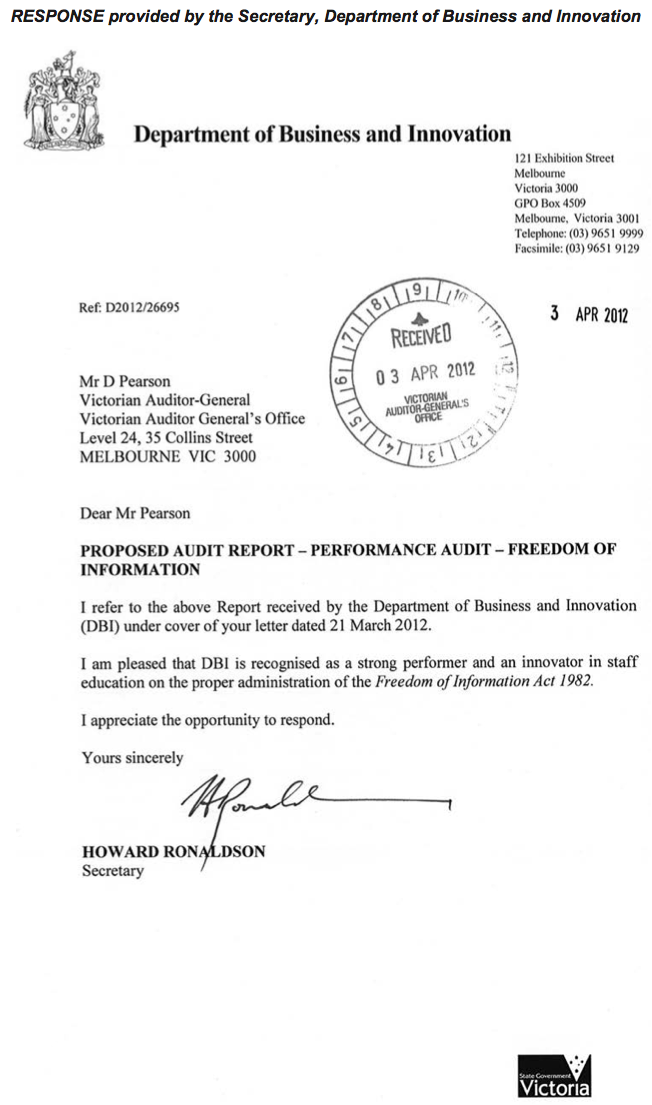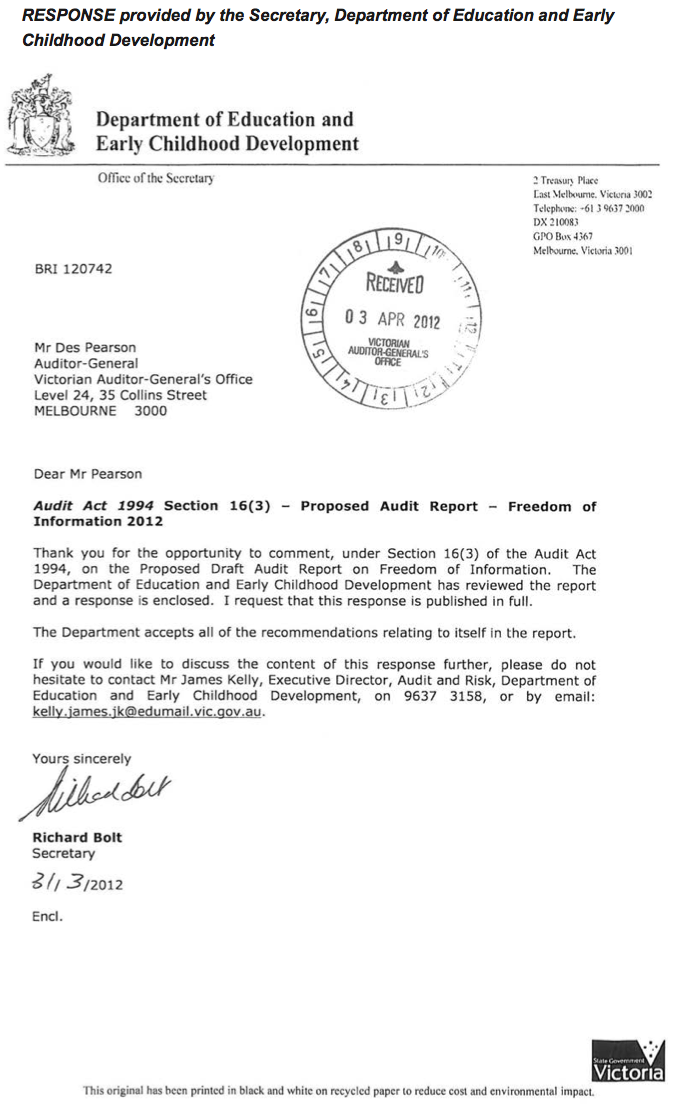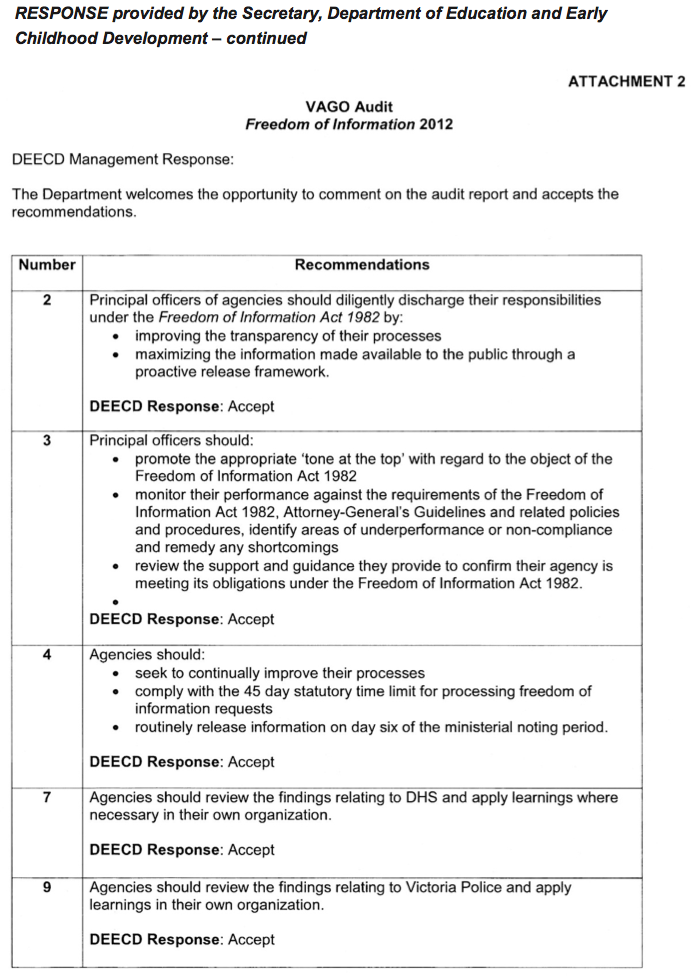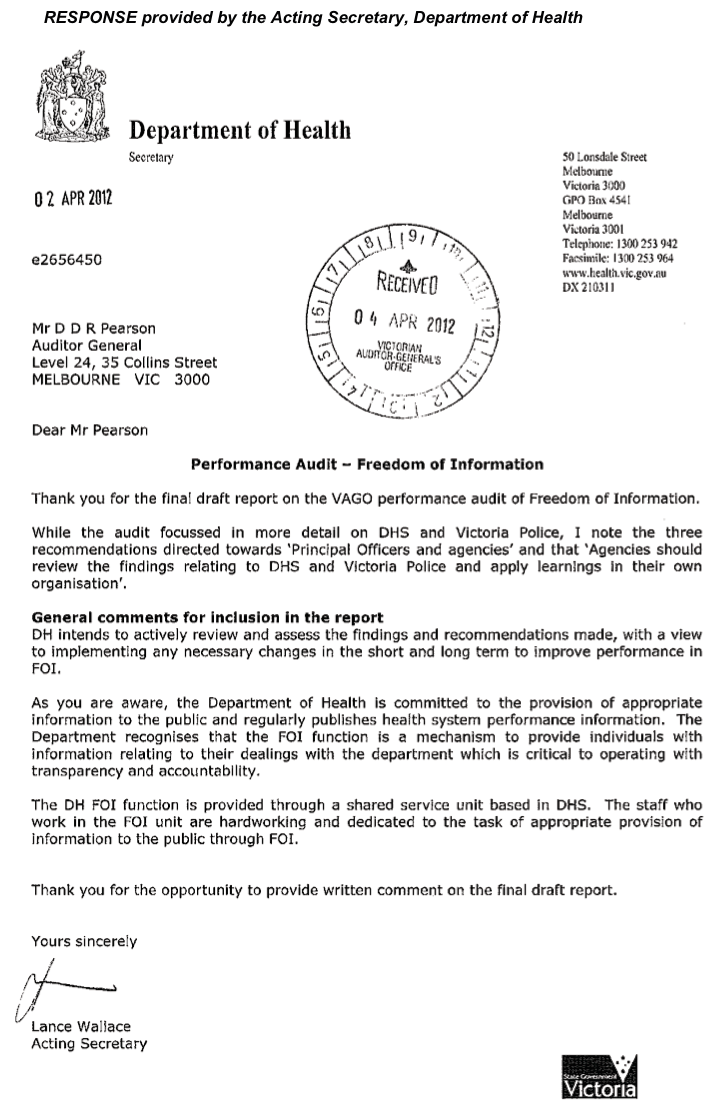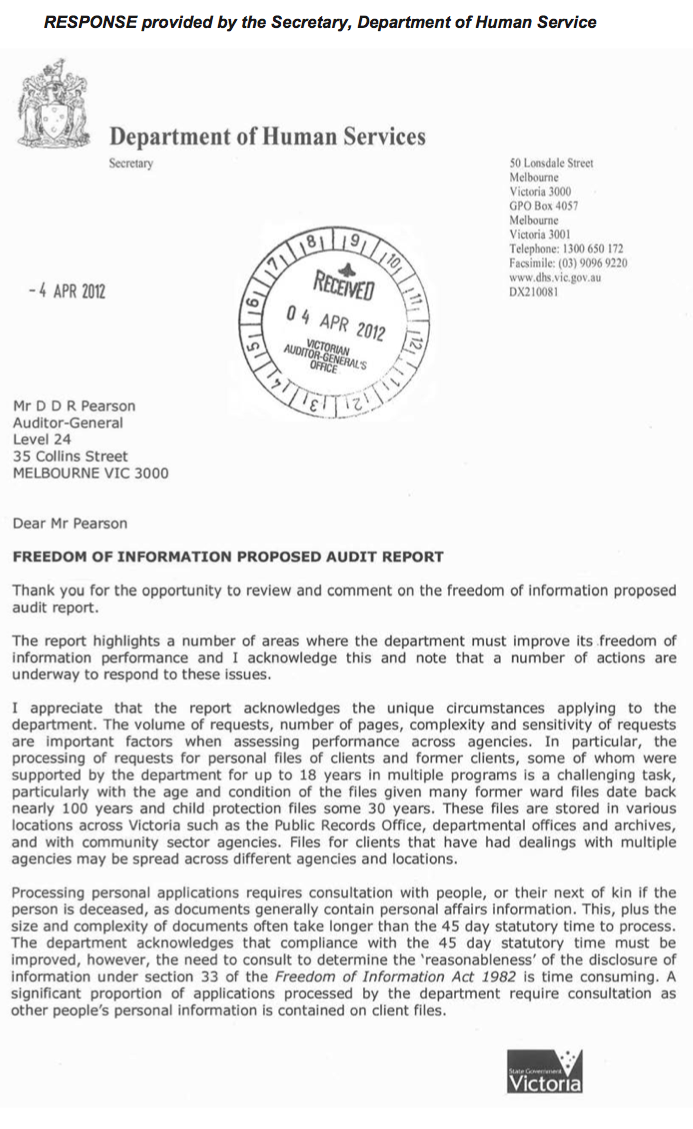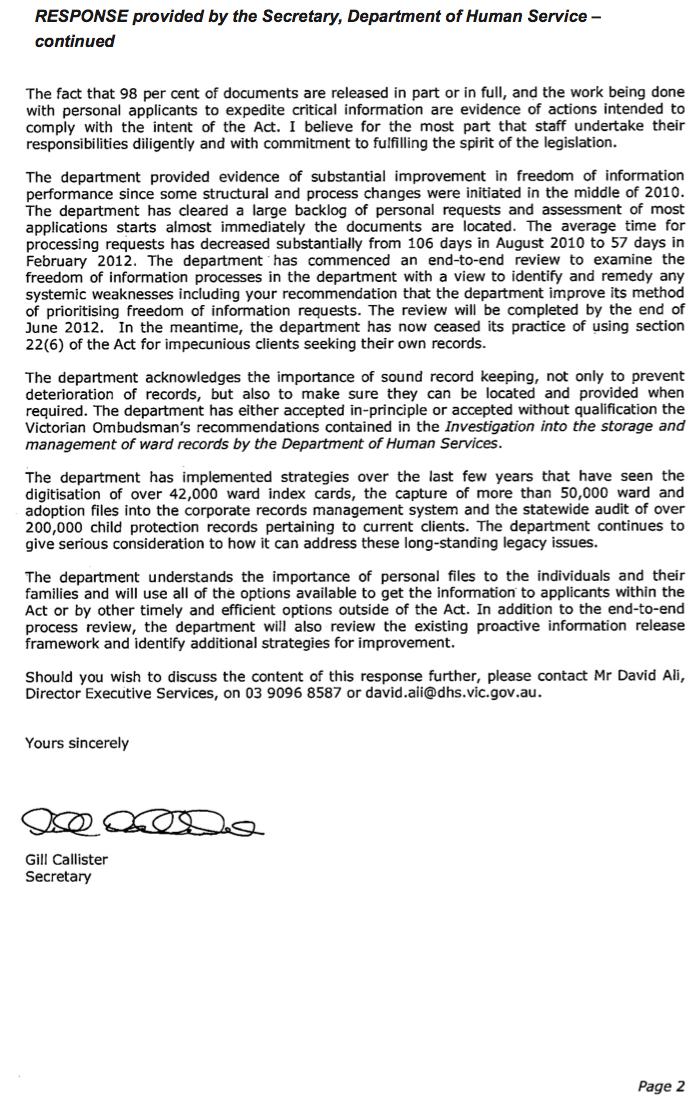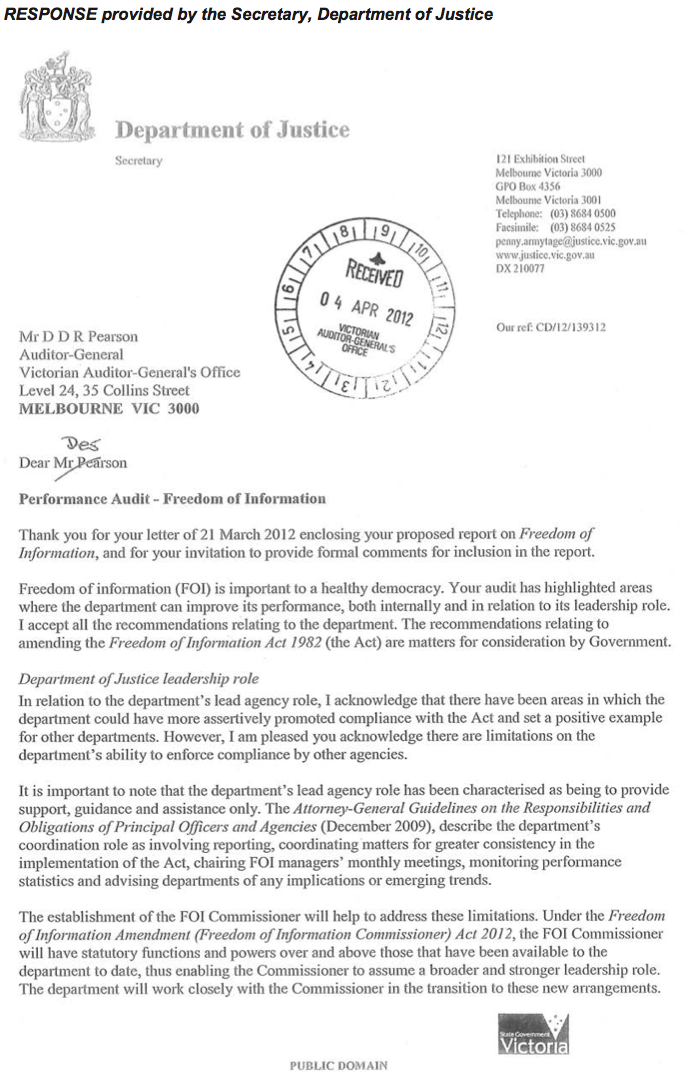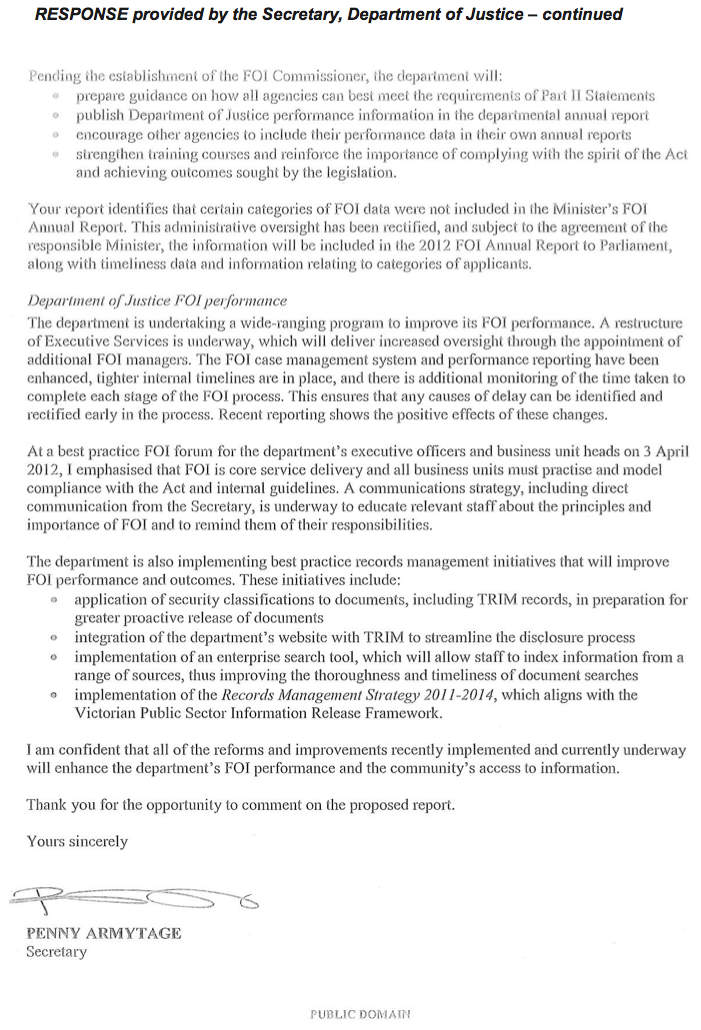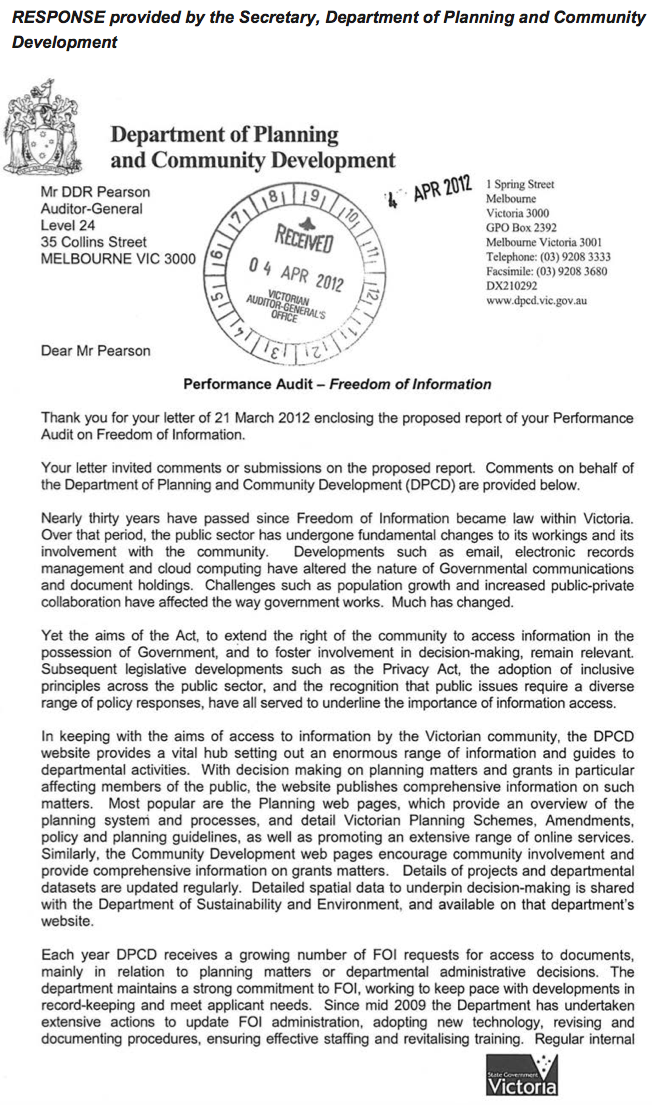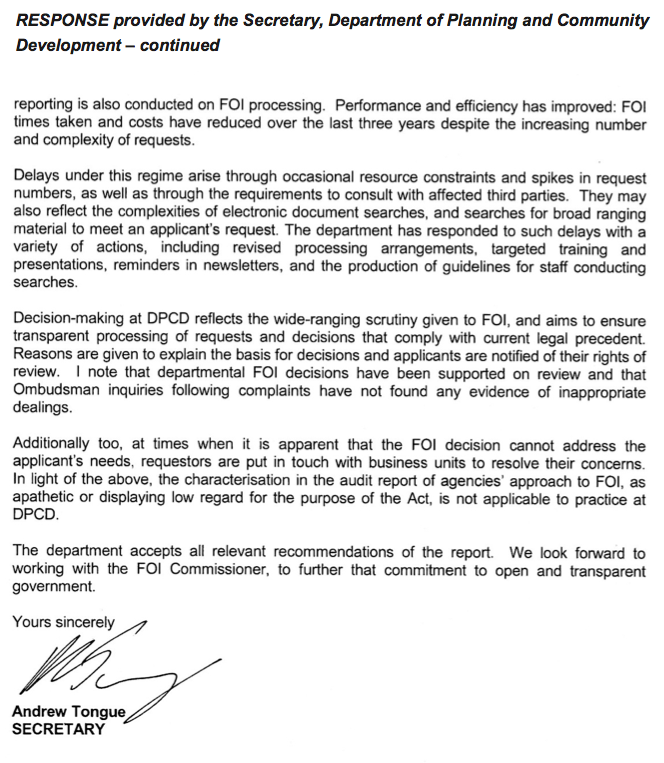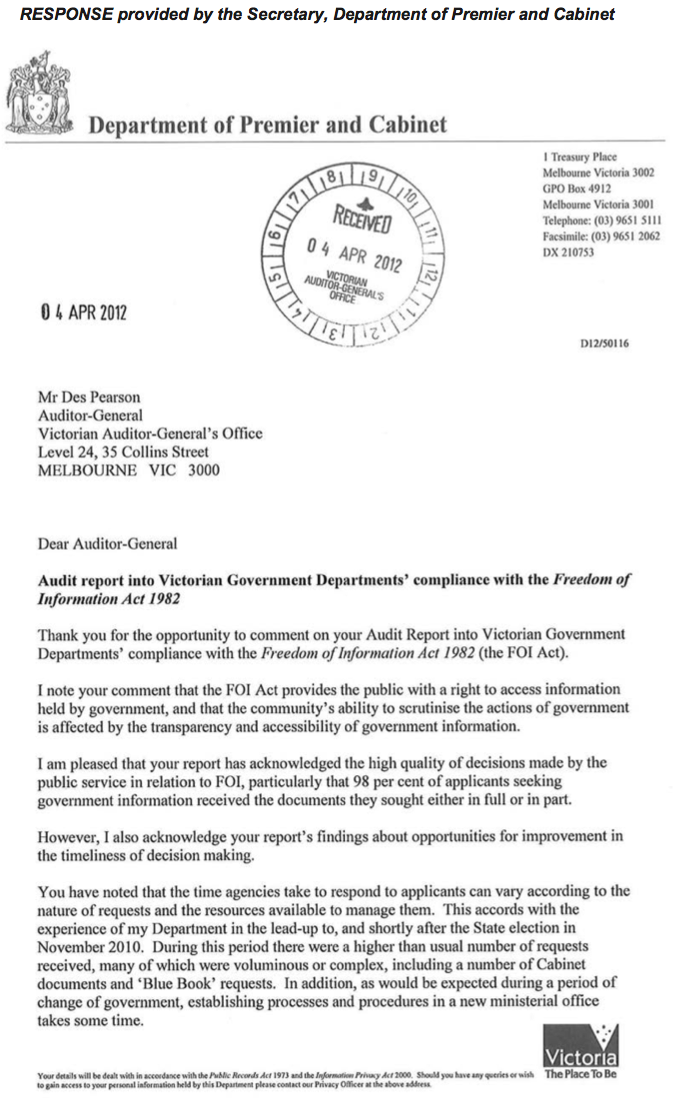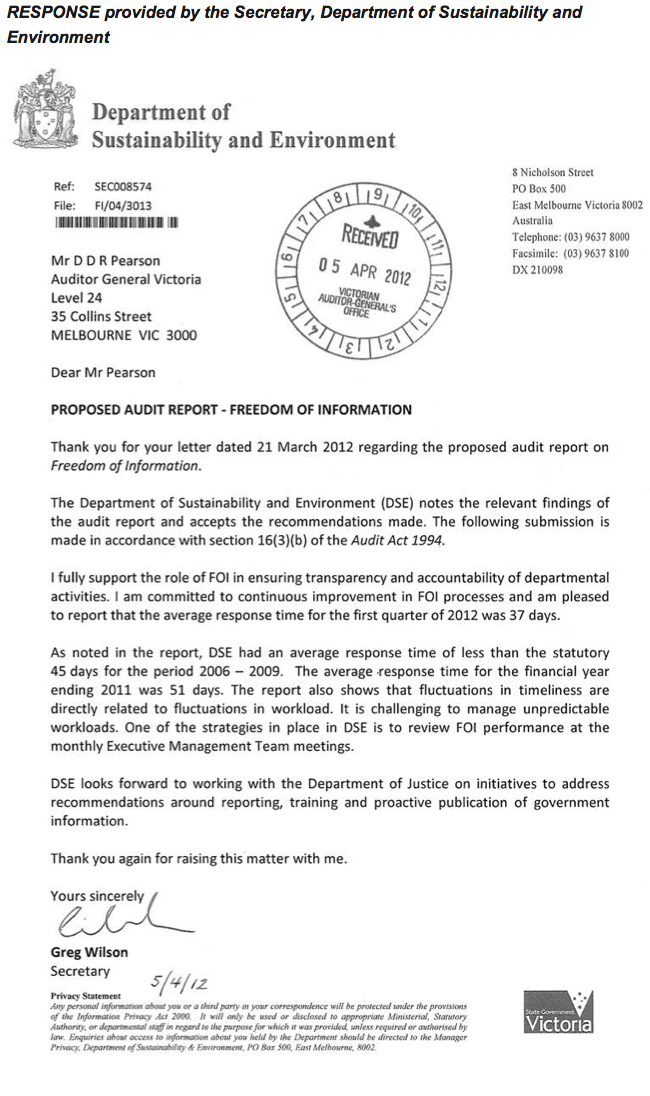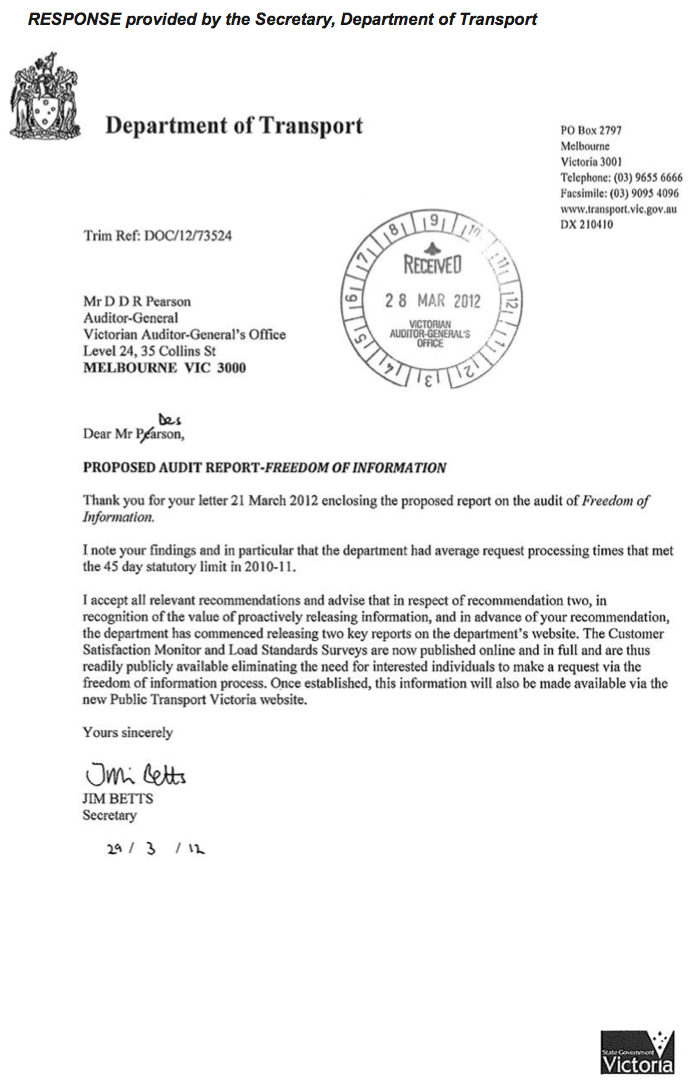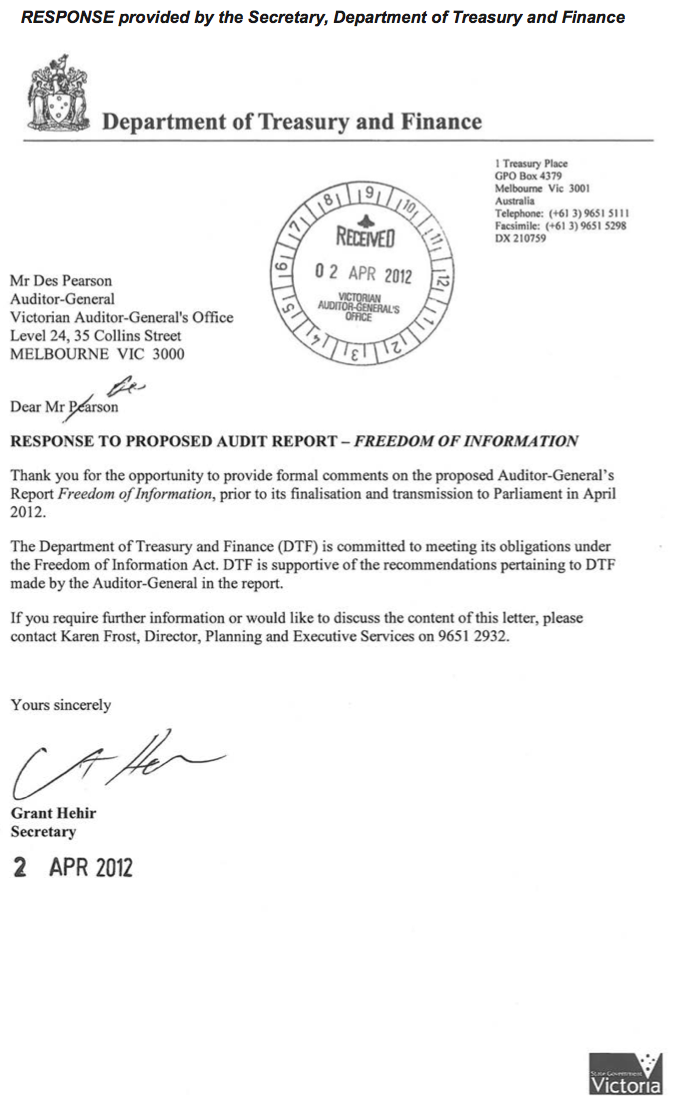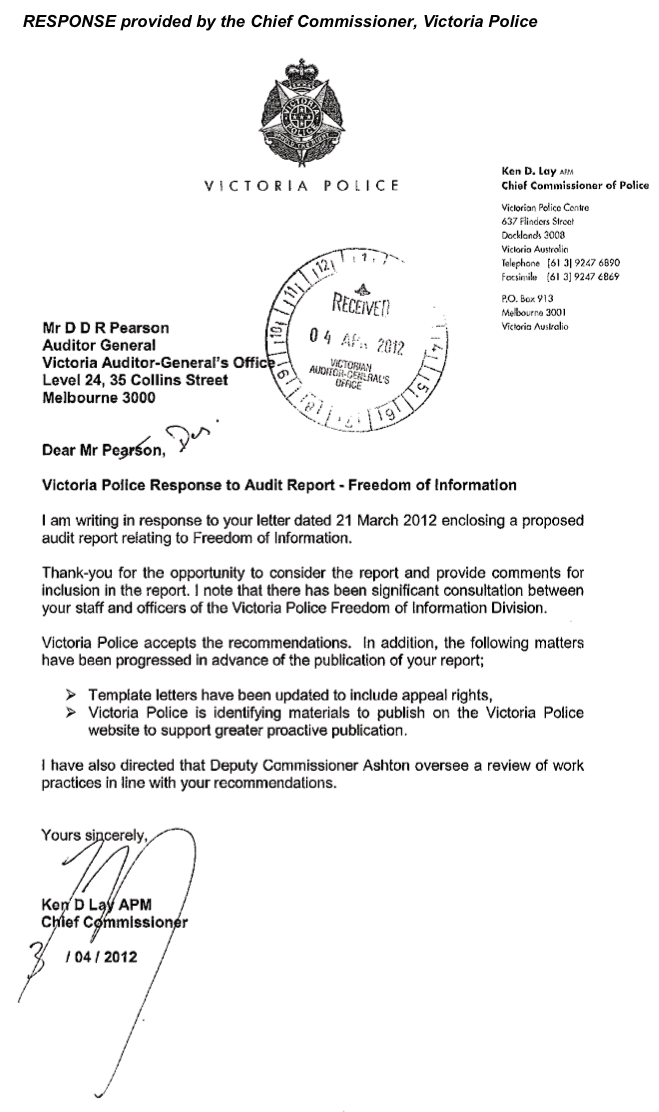Freedom of Information
Overview
The audit examined the extent to which the 11 Victorian public sector (VPS) departments and Victoria Police meet the requirements of the Freedom of Information Act 1982.
Freedom of Information (FOI) is a cornerstone of a thriving democracy.
Since FOI legislation was introduced 30 years ago, Victoria has gone from being at the forefront of FOI law and administration to one of the least progressive jurisdictions in Australia. Over time, apathy and resistance to scrutiny have adversely affected the operation of the Act, restricting the amount of information being released. As a result, agencies are not meeting the object of the Act, which is ‘to extend as far as possible the right of the community to access information’.
The public’s right to timely, comprehensive and accurate information is consequently being frustrated. The VPS’s systemic failure to support this right is a failure to deliver Parliament’s intent.
The prevailing culture and lack of transparent processes allow principal officers—secretaries and chief executive officers of agencies—to avoid fulfilling their responsibilities. Principal officers are not being held to account for their agency’s underperformance and non-compliance. Agencies are routinely disregarding the 45- day statutory time limit for processing requests and the five-day ministerial noting period, and there are serious flaws in record keeping practices and FOI searches in the Department of Human Services and Victoria Police.
The Department of Justice has not satisfactorily fulfilled its role as lead agency for FOI. More effective leadership is required to promote an appropriate culture, improve transparency of government information and adequately inform Parliament and the community about FOI.
Freedom of Information: Message
Ordered to be printed
VICTORIAN GOVERNMENT PRINTER April 2012
PP No 125, Session 2010–12
President
Legislative Council
Parliament House
Melbourne
Speaker
Legislative Assembly
Parliament House
Melbourne
Dear Presiding Officers
Under the provisions of section 16AB of the Audit Act 1994, I transmit my report on the audit Freedom of Information.
Yours faithfully
![]()
D D R PEARSON
Auditor-General
18 April 2012
Audit summary
Background
Freedom of information (FOI) is a cornerstone of a thriving democracy. FOI upholds the public’s fundamental right to access information held by the government. The community’s ability to scrutinise public sector activities and hold the government of the day accountable for its decisions is affected by the transparency and accessibility of government information.
Since the Freedom of Information Act 1982 (the Act) was introduced, both the number and the complexity of requests for information have increased considerably. In 2010–11 there were 34 052 FOI requests, compared to 4 702 requests in 1984–85, the first full year the Act was in operation.
The Victorian Ombudsman identified systemic problems in his 2006 review of FOI. These included a lack of timely responses, inconsistent application of the Act and lost or non‑existent documents. In his 2011 Annual Report the Ombudsman concluded that these problems still remained five years later.
The audit examined the extent to which all 11 Victorian public sector departments and Victoria Police meet the requirements of the Act and associated guidelines. A detailed assessment of the effectiveness and efficiency of FOI processes in Victoria Police and the Department of Human Services (DHS) was also performed. These two agencies were selected because they process 68 per cent of the FOI requests received by the 12 agencies audited.
Conclusions
Since FOI legislation was introduced 30 years ago, Victoria has gone from being at the forefront of FOI law and administration to one of the least progressive jurisdictions in Australia. Over time, apathy and resistance to scrutiny have adversely affected the operation of the Act, restricting the amount of information being released. As a result, agencies are not meeting the object of the Act, which is ‘to extend as far as possible the right of the community to access information’.
The public’s right to timely, comprehensive and accurate information is consequently being frustrated. The Victorian public sector’s systemic failure to support this right is a failure to deliver Parliament’s intent.
The prevailing culture and lack of transparent processes allow principal officers—secretaries and chief executive officers of agencies—to avoid fulfilling their responsibilities. Principal officers are not being held to account for their agency’s underperformance and non-compliance:
- In 2010–11, the average response time for eight of the 12 audited agencies exceeded the statutory deadline for responding to applicants’ requests.
- Of these agencies, four exceeded the 45-day time limit for over half of their requests.
- None of the agencies adequately complied with the mandatory reporting requirements of the Act.
- The principal officers of the Department of Premier and Cabinet (DPC), the Department of Health (DOH) and DHS have not managed adherence with ministerial noting periods consistent with the Attorney-General’s 2009 Guidelines on the Responsibilities and Obligations of Principal Officers and Agencies (the FOI Guidelines). This has led to delays in the release of documents.
- Agencies have not managed to reach agreement on a consistent, whole‑of‑government approach to the proactive release of information, which would reduce the reliance on FOI processes for the release of non-personal information.
- The more detailed review of DHS and Victoria Police revealed serious flaws in record keeping practices and FOI searches.
The cumulative effect of the multiple cultural and process issues is that the community does not receive the information it is entitled to receive, when it should receive it. Agency senior management is aware of these longstanding issues and their consequences, but has not taken sufficient action to address these systemic weaknesses.
This points to an absence of leadership and responsiveness, and a willingness of agencies to compromise the fundamental public service principles of integrity, accountability and respect. These are values that all public sector officials are expected to demonstrate under the Code of Conduct for Victorian Public Sector Employees. Principal officers who do not observe these values are failing the community and Parliament.
Embedding the appropriate pro-disclosure culture and processes, which underpin the intent of the Act, requires effective leadership. The Department of Justice (DOJ) has not adequately championed FOI across the public sector and, as such, has not satisfactorily fulfilled its role as the lead agency for FOI.
The introduction of the FOI Commissioner presents an opportunity for more proactive FOI leadership—in particular driving the cultural shift that is necessary to provide better quality services to the community. Significant change will only be possible if the commissioner is granted sufficient powers and resources. Since these amendments have not yet commenced, recommendations relating to the lead agency for FOI are addressed to DOJ, but will subsequently need to be reviewed once the FOI Commissioner has been appointed.
Findings
Department of Justice leadership
As the lead agency for FOI, DOJ is accountable for providing agencies with guidance and advising the minister responsible for the administration of the Act through the production of annual reports to Parliament on FOI performance. There have been significant shortcomings in the department’s approach in both of these areas.
Freedom of information culture and practices
DOJ has not adequately promoted and modelled the intent of the Act and accepted better practice, either in its own department or across the public sector. Specifically, DOJ has not:
- developed a proactive release framework for agencies
- addressed its own or other agencies’ processing delays
- complied with the reporting or timeliness requirements of the Act, nor encouraged other agencies to do so
- complied with the five-day ministerial noting time frame before documents are released.
The tolerance of these longstanding substandard practices, particularly with regard to proactive release, reflects an apathetic and obstructive culture. DOJ has acknowledged that it could have taken a stronger approach with agencies, but stated that its ability to address substandard practices is limited because it does not have adequate powers to mandate good practices. This lack of powers is not sufficient justification for DOJ to not exercise leadership. Further, there is no evidence that DOJ sought to extend its powers to address its inability to achieve an acceptable level of practice, consistent with the object of the legislation.
Proactively releasing information is an effective means of disseminating the maximum possible amount of information. It is recognised as better practice and, accordingly, is the approach adopted in other jurisdictions. Although Victorian agencies are publishing information, this does not necessarily constitute proactive release unless they have properly assessed the information to determine whether it is of significant public interest, appropriate, accurate, accessible and easy to use. This, combined with the continued reliance on formal FOI applications, means Victoria is less progressive than other jurisdictions.
Performance reporting
The apathy with regard to FOI is also evident in the reporting regime. The minister responsible for the Act relies on DOJ to collect, check and prepare data for inclusion in the FOI Annual Report to Parliament. However, DOJ is not reporting to the minister aspects of agencies’ performance as the letter and spirit of the Act requires.
DOJ does not report on measures that are explicitly specified in the Act, including disciplinary action taken against officers in respect to the administration of the Act, such as a breach of duty or misconduct.
DOJ collects information on the timeliness of agencies’ responses to FOI requests but does not include this information in the minister’s report to Parliament. Although DOJ is not specifically required to disclose this information to the minister, it is not precluded from doing so. Releasing agencies’ timeliness statistics would be in the spirit of the Act and encourage better performance.
Parliament and the public have the right to know if agencies’ performance is unsatisfactory. DOJ’s lack of comprehensive and transparent reporting in relation to the minister’s annual report does not satisfy the community’s expectations of a public sector agency.
Training
Training is an effective way to instil a positive FOI culture in agencies and to emphasise the importance of openness and transparency. DOJ’s FOI training program places too much emphasis on basic administrative process, rather than the intent of the Act. An important opportunity to promote a positive pro-release FOI culture has been missed.
Agency management
Timeliness of response is a good indicator of senior management’s attitude towards the importance of FOI. The number and complexity of requests can influence performance against the statutory time limit, however, the onus is on principal officers to provide adequate resources and support to meet the timeliness requirements. Only two of the audited agencies meet both the 45-day time limit and the five-day ministerial noting period.
Of the 12 agencies audited, only four had average request processing times that met the 45-day statutory limit in 2010–11. These were the Department of Education and Early Childhood Development, Department of Transport, Department of Primary Industries and Department of Treasury and Finance. The worst performing agencies were Victoria Police, DPC and DHS, which averaged 98, 92 and 75 days respectively.
Victoria’s underperformance against its legislative target is even more concerning when compared with other states. Other states have better processing completion rates against shorter or similar standard time limits. Extensions to these time limits may be granted, in certain circumstances.
The five-day ministerial noting period recommended in the FOI Guidelines was exceeded by eight of the 12 agencies. The worst performing department was DPC, with an average noting period of 41 days. One FOI request was with the Office of the Premier for 88 days. DHS and DOH also recorded noting periods in excess of 20 days. Long noting periods delay the release of information and impede the effective operation of the Act.
When agencies do not respect the FOI Guidelines, this not only compounds the delays in processing FOI requests but also contributes to the public perception that there is political interference in the FOI process, particularly when there is repeated consultation between an agency and a minister’s office on requests.
Victoria Police and DHS have both attempted to improve the timeliness of their responses. At Victoria Police, timeliness improved when additional resources were temporarily assigned to the FOI unit, while DHS improved its response time by prioritising requests.
Department of Human Services and Victoria Police
An effective FOI system relies on strong agency leadership and support, a robust understanding and application of the Act, good records management, appropriately defined searches and open communication with applicants.
DHS and Victoria Police, the two agencies reviewed in more detail, have significant deficiencies in these areas. As a consequence, the public is being denied access to information.
Processing fees and waiver of time frame
DHS is offering applicants the opportunity to waive processing charges if they forgo the requirement for DHS to meet the 45-day processing time limit. DHS is not advising applicants who have little or no money and are seeking information that relates to their personal affairs that they have a right to request a waiver of charges under the Act without waiving the 45-day time limit.
This unacceptable practice was not observed in any of the other audited agencies. It allows DHS to extend its time frame for responding to requests without recording those requests as overdue, giving the mistaken impression that the department’s timeliness performance is better than it actually is.
Records management
DHS and Victoria Police need to address deficiencies in their record keeping practices as a priority. Records are being lost, disposed of incorrectly or rendered inaccessible.
DHS’s record management facility has inappropriate physical storage conditions—causing records to deteriorate—and inefficient indexing systems. As a result, information cannot be found when needed.
Although Victoria Police has a policy outlining the appropriate storage of records, it has not addressed the informal practice of police officers storing records, such as note books, at their homes. This practice increases the likelihood that these records may be lost or difficult for Victoria Police to locate.
Search techniques
DHS and Victoria Police both need to remedy weaknesses in their FOI searches to provide appropriately scoped responses.
DHS does not include records held by its contracted community service organisations (CSO) in the FOI requests the department processes. Instead, DHS refers applicants to the relevant CSOs. The quality of record keeping practices of CSOs varies widely and, consequently, so does the amount of information available to DHS’s clients.
DHS is failing to discharge its obligations to its clients. The Act refers to ‘possession’ when defining a document, not ownership. DHS has a right to possess CSO records under its service agreements, therefore CSO documents are subject to the Act. Furthermore, the department is contravening the specifications set out by the Public Records Office Victoria and the FOI Guidelines.
Victoria Police’s FOI unit does not conduct sufficiently thorough and diligent searches. The unit does not inspect proof of disposal documents to confirm whether documents cannot be provided because they no longer exist.
Communication with applicants
DHS employs specialists to assist clients with child protection and ward of the state requests. These officers discuss the applicants’ needs, which enables them to scope requests to better meet applicants’ requirements. This is good practice and helps DHS redefine requests to better provide applicants with the information they need. DHS also surveys applicants to promote continuous improvement.
Although internal reviews upheld the original decision in 79 per cent of cases in the 12 audited agencies, it is unknown how many FOI applicants are dissatisfied with the outcome of their request but did not appeal the decision, either out of choice or ignorance of their rights. The in‑depth review of Victoria Police’s practices revealed applicants are not being appropriately advised of their right to complain to the Victorian Ombudsman or appeal decisions. This is contrary to legislative requirements.
Victoria Police could provide clearer information on its website on those areas where information is released outside of the Act. For instance, motor vehicle accident information can be purchased outside of the Act and information for court proceedings can be obtained through subpoenas. Clearer communication would reduce the number of requests for these types of information that are currently incorrectly made under FOI.
Recommendations
-
The Department of Justice should provide stronger leadership in acquitting its statutory obligations to Parliament by:
- reviewing the Freedom of Information Act 1982 to improve its currency and to champion the proactive release of information
- overhauling the content and frequency of current reporting requirements
- providing detailed guidance on proactive disclosure for agencies
- providing more comprehensive and tailored training.
-
Principal officers of agencies should diligently discharge their responsibilities under the Freedom of Information Act 1982 by:
- improving the transparency of their processes
- maximising the information made available to the public through a proactive release framework.
-
Principal officers should:
- promote the appropriate ‘tone at the top’ with regard to the object of the Freedom of Information Act 1982
- monitor their performance against the requirements of the Freedom of Information Act 1982, the Attorney‑General’s 2009 Guidelines on the Responsibilities and Obligations of Principal Officers and Agencies and related policies and procedures, identify areas of underperformance or non-compliance and remedy any shortcomings
- review the support and guidance they provide to confirm their agency is meeting its obligations under the Freedom of Information Act 1982.
-
Agencies should:
- seek to continually improve their processes to comply with the 45-day statutory time limit for processing freedom of information requests
- routinely release information on day six of the ministerial noting period.
-
The Department of Justice should drive continuous improvement by, in the longer term, giving consideration to adjusting the statutory time frame in line with other Australian jurisdictions.
-
The Department of Human Services should:
- improve its record management practices to minimise loss of documents and enhance access to information
- cease its practice of using section 22(6) for clients who have little or no money and are seeking their own records
- include community service organisations’ records when processing freedom of information applications
- improve its method of prioritising freedom of information requests.
-
Agencies should review the findings relating to the Department of Human Services and apply lessons where necessary in their own organisation.
-
Victoria Police should:
- improve its record management practices to minimise loss of documents and enhance access to information
- improve its responsiveness by reviewing its work practices in the first instance, and then, if necessary, considering the resources of its freedom of information unit
- appropriately scope freedom of information requests
- inform freedom of information applicants of their review rights.
-
Agencies should review the findings relating to Victoria Police and apply lessons where necessary in their own organisation.
Submissions and comments received
In addition to progressive engagement during the course of the audit, in accordance with section 16(3) of the Audit Act 1994 a copy of this report was provided to the Department of Business and Innovation, the Department of Education and Early Childhood Development, the Department of Health, the Department of Human Services, the Department of Justice, the Department of Planning and Community Development, the Department of Premier and Cabinet, the Department of Primary Industries, the Department of Sustainability and Environment, the Department of Transport, the Department of Treasury and Finance and Victoria Police with a request for submissions or comments.
Agency views have been considered in reaching our audit conclusions and are represented to the extent relevant and warranted in preparing this report. Their full section 16(3) submissions and comments however, are included in Appendix B.
1. Background
1.1 Introduction
Openness, accountability and transparency are fundamental principles of democratic government. The Freedom of Information Act 1982 (the Act) was designed to promote these principles in the Victorian public sector by giving the public the right to access government information.
The second reading speech of the Freedom of Information Bill advised Parliament that:
‘Freedom of information is very closely connected with the fundamental principles of a democratic society and is based on three major premises:
- The individual has a right to know what information is contained in government records about him or herself.
- A government that is open to public scrutiny is more accountable to the people who elect it.
- Where people are informed about government policies, they are more likely to become involved in policy making and in government itself’.
Government information does not belong to government. It belongs to the public to whom the government is accountable. The public can therefore rightfully expect freedom of information (FOI) practices, and public sector officials, to support and uphold the community’s democratic right to access government information.
1.2 Freedom of information legislation
The Commonwealth Government enacted the first Australian FOI legislation in 1982. Victoria was at the forefront of FOI law and administration at that time, being the first of the states to pass its own legislation.
1.2.1 Purpose of the Freedom of Information Act 1982
The object of the Act is to ‘extend as far as possible the right of the community to access information in the possession of the Government of Victoria’. This general right of access to information should only be limited when it is necessary to protect public, personal and commercial interests.
The Act applies to information held by government ministers and 1 000 public sector agencies, including departments, local councils, statutory authorities, public hospitals, universities, TAFE colleges and schools.
The Act gives members of the public:
- a legally enforceable right of access to documents in the possession of government bodies, subject to certain exemptions
- the ability to request the correction of information on personal files where this information is inaccurate or incomplete
- a right to seek a review of decisions made.
The Act also requires agencies to:
- publish information on their organisation, functions, documents, internal rules and reports
- respond to applicants within 45 days of receiving an FOI request. This time period may be extended with the applicant’s agreement.
The second reading speech of the FOI Bill also stated that, in situations where it may not be clear whether information should be released, the guiding principle should be to facilitate disclosure where possible.
In order to assist with the effective administration of FOI legislation, in December 2009 the Department of Justice (DOJ) released the Attorney-General’s Guidelines on the Responsibilities and Obligations of Principal Officers and Agencies (the FOI Guidelines). The FOI Guidelines define the principles underpinning the responsibilities of principal officers—secretaries and chief operating officers of agencies—and other participants in the FOI process. They also provide the minimum standards for FOI processes that agencies are required to follow. DOJ has also issued a set of Practice Notes to assist FOI practitioners.
1.3 Roles and responsibilities
1.3.1 Lead agency role
As the lead agency for FOI, DOJ oversees the application of FOI across the public sector. While the primary responsibility for FOI decisions rests with individual agencies, DOJ coordinates as far as possible an agreed approach to achieve consistency in the interpretation and processing of multi-agency requests. DOJ provides FOI training and prepares the Freedom of Information Annual Report, which is a statistical overview of agencies’ administration of the Act.
1.3.2 Decision-maker role
Ministers and principal officers are empowered to make FOI decisions on behalf of their agency and are responsible for overseeing their agency’s obligations under the Act. However, in practice FOI officers are authorised to make FOI decisions on behalf of the principal officer.
FOI officers across the 11 departments and Victoria Police are typically mid‑level public sector employees.
In broad terms, FOI officers are responsible for:
- consulting with applicants who are requesting information
- searching for documents and liaising with content experts and other third parties regarding the release of information
- assessing documents in accordance with the Act
- preparing letters of outcome, which contain the reasons for their decision on an FOI request, any exemptions applied and the applicants’ review rights.
1.3.3 Code of conduct
Public servants are bound by a code of conduct under the Public Administration Act 2004. The Code of Conduct for Victorian Public Sector Employees describes how public officials are expected to conduct themselves in their role. The code of conduct is particularly relevant to FOI officers, as their work requires them to interact directly with the public and make important judgements on the release of information.
The code of conduct directs public officials to demonstrate values including:
- responsiveness—by providing high quality services to the Victorian community, and identifying and promoting best practice
- integrity—by being honest, open and transparent, using powers responsibly, and striving to earn and sustain public trust of a high level
- impartiality—by making decisions and providing advice on merit and without bias, caprice, favouritism or self-interest
- accountability—by accepting responsibility for their decisions and actions,submitting themselves to appropriate scrutiny, and respecting colleagues, public officials and members of the Victorian community by treating them fairly and objectively
- leadership—by actively implementing, promoting and supporting these principles.
There are also special requirements, in the code of conduct, that apply to information that may be called upon under FOI legislation. Public sector employees are required to:
- handle official and personal information according to relevant legislation and public sector body policies and procedures
- maintain accurate and reliable records as required by legislation, policies and procedures. These records are to be kept in a way that assures their security and reliability, and allows them to be made available to appropriate scrutiny when required.
1.4 Number, nature and complexity of requests
According to DOJ’s annual report on FOI, 34 052 requests for information were made in 2010–11. This is a substantial increase of 624 per cent since the first record of FOI requests in 1984–85.
There is considerable variation in the number, nature and complexity of FOI requests received by agencies:
- Of the 5052 FOI requests received by the 12 agencies subject to this audit, 2381 were sent to Victoria Police (47 percent), 1047 to DHS (21 percent) and 546 to DOJ (11 percent).
- The number of requests received varies significantly from month to month, as shown in Appendix A. This can present challenges in planning and resourcing.
- Victoria Police, DHS and DOJ mainly receive personal requests while the Department of Premier and Cabinet (DPC), Department of Treasury and Finance (DTF) and Department of Business and Innovation (DBI) are more likely to receive requests from the media and Members of Parliament.
- Some FOI requests are more complex than others. For example, in the case of child protection matters, FOI officers must carefully consider extensive, and sometimes complicated, family relationships.
These factors naturally have some influence on how agencies manage and resource their FOI process.
1.5 Freedom of information process
The FOI process is informed by the Act, the FOI Guidelines and DOJ’s Practice Notes.
1.5.1 Freedom of information requests
FOI requests must be made in writing, either in a letter or electronically, and an application fee and access charges apply, except in limited circumstances. The Act requires agencies to waive their fees for applicants who are deemed to have little or no money if they are seeking information regarding their personal affairs.
Agencies are required to assist applicants if the request is unclear, too broad, or if there is a more efficient way of obtaining the information.
1.5.2 Processing freedom of information requests
The nature of FOI requests differs across agencies in terms of the number of requests received, the number of pages to be analysed per request and their complexity.
Nonetheless, the steps taken to process an FOI application are essentially the same across all agencies. DOJ has developed recommended time lines for its own FOI process, as shown in Figure 1A.
Figure
1A
Stages and time lines for completing FOI requests
Stage |
Time line (calendar days) |
Action |
|
|---|---|---|---|
Receipt and acknowledgment |
Days 1–3 |
The FOI unit receives the FOI request, and checks it is clear and that the application fee has been paid or waived. |
|
Search |
Days 3–10 |
The FOI unit asks the relevant business units to conduct a document search. The business units provide the relevant documents and advice to the FOI unit. |
|
Document assessment |
Days 10–24 |
An FOI officer assesses the documents to determine what information may be released and if any exemptions should be applied. The FOI officer drafts a proposed response to the applicant. |
|
Noting by the department |
Days 24–30 |
The FOI unit sends the proposed response to the business unit’s executive director for noting. The FOI unit may also send topical requests from Members of Parliament and the media to the secretary for noting. |
|
Noting by the minister’s office |
Days 30–36 |
The FOI unit sends topical requests to the minister’s office for noting. |
|
Release |
By day 45 |
The FOI unit advises the applicant of its decision and the decision letter is sent to them along with any released information. |
|
Source: Victorian Auditor General’s Office.
1.5.3 Exemptions
Although the purpose of the Act is to make the maximum possible amount of information held by government available to the public, the Act recognises that the disclosure of certain information could have adverse effects. Consequently, exemptions may be applied to avoid releasing particularly sensitive information.
The three most common exemptions claimed by agencies in 2010–11 were:
- personal affairs (2 908 exemptions)—where releasing a document would involve unreasonable disclosure of another individual’s personal information
- internal working documents (371 exemptions)—opinions, advice or recommendations prepared by agency or ministerial staff as part of deliberations or consultations, where it is not in the public interest to release this information
- documents to which secrecy provisions apply (346 exemptions)—a document is exempt if there is a secrecy provision which prohibits the disclosure of this information.
Exemptions may also apply to voluminous requests, Cabinet documents, law enforcement information, commercially sensitive materials and documents that are subject to the secrecy provisions of other Acts.
Of the total requests received across the public sector in 2010–11, 78 per cent of applicants were eventually granted full access, 20 per cent were granted partial access and 2 per cent were denied access.
1.5.4 Right to appeal a decision
Applicants have a right to appeal when access to documentation is denied or when only partial access is granted. Applicants may:
- request an internal review of an FOI officer’s decision. Victorian public sector agencies carried out internal reviews of 400 application decisions in 2010–11. These reviews confirmed the initial decision in 70 percent of cases, varied the decision in 25percent and overturned the decision in 5percent.
- lodge an appeal with the Victorian Civil and Administrative Tribunal (VCAT). In 2010–11, 172 appeals were lodged at VCAT, 125 were withdrawn and 54 decided. VCAT confirmed agency decisions in 91 per cent of cases decided and partially upheld the decisions in 9 per cent. VCAT did not overturn any FOI decisions made by agencies. The rounding difference is due to requests being lodged and decided in different years.
- complain to the Victorian Ombudsman if the documents do not exist or cannot be located. Agencies are required to inform applicants of this right.
Responsibility for some of these actions is expected to transfer to the proposed new FOI Commissioner.
1.6 Evolution of freedom of information
In recent years, comprehensive legislative reforms regarding the release of public information have been undertaken in Queensland, Western Australia, New South Wales and by the Commonwealth government. Similar wide-ranging reforms have not taken place in Victoria since the Act was introduced in 1982.
The most significant proposed amendment to the Victorian FOI Act in recent times is the creation of the FOI Commissioner.
1.6.1 Freedom of Information Commissioner
The Freedom of Information Amendment (Freedom of Information Commissioner) Bill 2011 received Royal Assent on 6 March 2012.
The functions and powers of the FOI Commissioner as set out in the Bill are to:
- promote agencies’ understanding and acceptance of the Act and its purpose
- provide advice, education and guidance to agencies in relation to professional standards prescribed by the regulations, and monitor compliance with those standards
- provide advice, education and guidance to agencies and the public in relation to the commissioner’s functions
- conduct reviews of agencies’ decisions on applicants’ requests for information, replacing the current internal review process
- receive and handle complaints
- report on the operation of the Act
- provide advice to the minister responsible for the administration of the Act, on request, in relation to the operation and administration of the Act
- perform any other functions conferred on the commissioner under this or any other Act.
The FOI Commissioner, once appointed, will take on many of DOJ’s leadership responsibilities. Consequently, recommendations in this report that relate to DOJ’s lead agency role will naturally transfer to the FOI Commissioner. This report should serve as a basis to the FOI Commissioner’s endeavours to drive change.
Previous reviews
The Victorian Ombudsman has tabled several reports in Parliament in recent years, highlighting serious deficiencies in FOI administration.
The Ombudsman’s last comprehensive review of FOI was in 2006. The Review of the Freedom of Information Act identified a lack of timely responses, inconsistencies in the application of the Act, a refusal to provide access to information, and lost or non‑existent documents.
The Ombudsman’s Annual Report 2011 Part 1 also reported on significant and systemic concerns with the administration of the Act by government agencies. The Ombudsman commented that he continued to see significant delays and restrictive practices and that, despite assurances from agencies that processes would be improved, the same issues arise each year.
The FOI Commissioner will deal with all complaints regarding FOI matters, replacing the Victorian Ombudsman’s oversight role in this area. The FOI Commissioner does not have the coercive powers of the Ombudsman, which include summonsing people and evidence, and taking sworn evidence.
1.7 Audit objectives and scope
The audit objectives are to determine the extent to which:
- departments and agencies comply with the Act and the FOI Guidelines
- FOI is administered effectively and efficiently in selected agencies.
This audit included the 11 departments and Victoria Police, with detailed examination of two agencies: Victoria Police and DHS.
1.8 Report structure
The rest of this report is structured as follows:
- Part 2 assesses DOJ’s leadership with regard to compliance and better practice
- Part 3 examines agencies’ management of FOI
- Part 4 analyses DHS’s management of FOI
- Part 5 analyses Victoria Police’s management of FOI.
1.9 Audit method and cost
The audit was performed in accordance with the Australian Auditing and Assurance Standards. The total cost of the audit was $475 000.
2. Department of Justice leadership
At a glance
Background
The Department of Justice (DOJ) is the lead agency for freedom of information (FOI). It is responsible for promoting FOI better practice across the public sector and reporting agencies’ FOI performance to Parliament.
Conclusion
Victoria was at the forefront of FOI legislation and practices 30 years ago. However, it has fallen behind other states in terms of the information being released and the reporting of FOI. More effective leadership and oversight from DOJ are required to promote an appropriate pro-release culture, to improve transparency of government information and to adequately inform Parliament and the community about FOI.
Findings
- DOJ has not adequately championed the proactive release of information.
- DOJ’s preparation of the annual report to Parliament on agencies’ FOI performance does not fulfil the letter or intent of the Freedom of Information Act 1982 (the Act).
- Training for FOI officers is inconsistent and focuses on the technical application of the Act, rather than the outcomes sought by the legislation.
- There is considerable scope and opportunity for the new FOI Commissioner to improve practices and the culture.
Recommendations
DOJ should provide stronger leadership in acquitting its statutory obligations to Parliament by:
- reviewing the Act to improve its currency and to champion the proactive release of information
- overhauling the content and frequency of current reporting requirements
- providing detailed guidance on proactive disclosure for agencies.
Principal officers should diligently discharge their responsibilities under the Act by improving the transparency of their processes and by maximising the information made available to the public through a proactive release framework.
2.1 Introduction
The Department of Justice (DOJ) is the lead agency for freedom of information (FOI). It is accountable for promoting FOI compliance and better practice across the Victorian public sector (VPS).
The Freedom of Information Act 1982 (the Act), and the Attorney-General’s 2009 Guidelines on the Responsibilities and Obligations of Principal Officers and Agencies (the FOI Guidelines) provide the legislative and policy framework for FOI.
These documents promote the disclosure and dissemination of information through practices such as proactively releasing information to inform the public instead of reactively responding to individual FOI requests. The Act and the FOI Guidelines also set out the general reporting requirements on FOI operations, including a consolidated annual FOI report produced by DOJ on behalf of all VPS agencies. DOJ also provides additional guidance to help agencies interpret and apply the Act and The FOI Guidelines in the form of officer training, an FOI website and Practice Notes.
DOJ’s leadership role will largely transfer to the new FOI Commissioner following the passage into law of the Freedom of Information Amendment (Freedom of Information Commissioner) Bill 2011.
This Part examines DOJ’s leadership performance and role in setting the culture around FOI, including DOJ’s actions with regard to establishing a proactive release framework, fulfilling FOI reporting requirements and providing guidance to agencies.
2.2 Conclusion
Victoria was a leader in FOI 30 years ago. However, since then, its approach has deteriorated seriously and it is now less transparent than other jurisdictions. A lack of strong leadership by DOJ has allowed the emergence of a culture that is resistant to scrutiny. As a result, Parliament and the community are not being adequately informed about agencies’ business and the operation of FOI in the VPS.
More purposeful leadership is required to promote the proactive release of information that is of significant public interest. This approach is in the spirit of the Act and is also recognised as better practice in other jurisdictions.
DOJ’s attempts to put in place a whole-of-government proactive release framework have met with resistance from agencies. This framework presents an opportunity to improve the transparency of agencies’ operations and should be pursued. Agencies’ application of this model should be centrally monitored and action plans promptly put in place to remedy underperformance.
Progress against these plans should be followed up on a regular basis, as agencies have an unsatisfactory record of taking action to improve FOI practices. None of the 12 audited agencies implemented all of the recommendations made by the Victorian Ombudsman in 2006. This is indicative of a poor, resistant culture and low level of priority placed on FOI, which DOJ has not managed to address effectively.
Reporting practices also require more purposeful leadership and oversight. The current reporting regime is neither transparent nor robust. DOJ is tolerating disregard for the letter and spirit of the legislation, and has not led by example:
- DOJ and the 11 other agencies do not fully comply with legislative reporting requirements.
- DOJ has not taken the initiative to release information that was not required by legislation, but was in the public interest. The most notable example of this is non-reporting of agencies’ poor performance against the statutory time frame for responding to FOI requests.
While DOJ’s website and Practice Notes provide guidance to agencies, these do not replace the need for formal training. The current training is focused on basic administrative processes. DOJ should tailor the training to better suit participants’ needs and to place more emphasis on the outcomes sought by the Act. This important opportunity to promote a positive pro-release FOI culture has been missed.
The introduction of the new FOI Commissioner presents the opportunity for more proactive FOI leadership—particularly in driving the cultural shift that is necessary to provide better quality FOI services to the community.
2.3 Proactive release
The object of the Act is to release the maximum possible amount of information. Proactively releasing information, instead of responding to individual FOI requests, is an effective means of achieving this aim.
Agencies publish a significant amount of information both, in hard copy and on the internet, and particularly in the case of Victoria Police, through press conferences. However, there is a distinction between publishing information and proactively releasing information.
Proactive release involves a structured, wide-ranging assessment of the information held by an agency to determine what should be disseminated to the public and how this should be managed. The information should be of significant public interest, appropriate, accurate, accessible and easy to use. The cost to the public of obtaining the information should also be considered.
When managed effectively, proactive release increases the amount of information available to the public. This means there is less need for the public to use the FOI process, which in turn reduces agencies’ FOI workload for non-personal information requests. It is also consistent with the intent of the Act.
2.3.1 Impetus for proactive release
Legislative provisions and other directions exist to support the proactive release of information.
The Act states that ministers and agencies should make the ‘maximum amount of government information promptly and inexpensively available to the public’.
The FOI Guidelines state that ‘freedom of information applications should be a means of last resort to gain access to information on the policies and activities of government’.
The FOI Guidelines further encourage agencies to consider ways of releasing information outside the FOI process and on a regular proactive basis. Principal officers—secretaries and chief executive officers of agencies—are accountable for confirming their agency meets these requirements.
The Code of Conduct for Victorian Public Sector Employees, issued by the Public Sector Standards Commissioner, requires public officials to provide high-quality services to the Victorian community and to identify and promote better practice. Proactive release is widely regarded as better practice in other jurisdictions.
However, the lack of strong leadership and the tolerance of a culture that resists transparency mean that VPS agencies are not reflecting these directions in their current practices. Victorian agencies are less progressive than their counterparts in other jurisdictions.
2.3.2 Proactive release framework
As the lead agency for FOI, DOJ has not persistently championed the proactive release of information across the VPS.
DOJ attempted to progress a specific framework for proactive release, the Proactive Publication Scheme (PPS), in 2009. Under the scheme, agencies would publish information commonly sought under FOI, such as executive officers’ salary bonuses and expenditure on taxis. However, agencies could not agree on common templates that would allow DOJ to collate the required information and PPS stalled. DOJ has not progressed PPS since 2010.
In February 2011 work began on the development of the Public Sector Information Release Framework (PSIRF) to guide the management and release of public sector information. All 12 agencies are participants in the development of PSIRF. PSIRF could potentially provide a framework for greater proactive release across the VPS. However, more than a year after the project began, there is still no scheduled release date for this framework.
Although agencies do release large amounts of information to the public, the absence of a proactive release framework means there are inconsistencies between agencies in the information available to the public. A framework would provide a coordinated and consistent whole‑of-government approach to proactively releasing information. This would help agencies use a standard method and criteria to identify what type of information they should be releasing and how they should go about doing this. This involves determining whether information is of significant public interest, appropriate, accurate, accessible and easy to use.
Without the structured assessment process of a PPS, agencies’ actions constitute publication, but not proactive release.
Figure 2A provides some examples of information published by agencies.
Figure
2A
Agency publication
Department of Treasury and Finance:
- reports, guidelines and research papers
- financial data sets
- details of overseas visits undertaken by staff
- major promotional, public relations and marketing activities
Department of Health:
- the Victorian Health Services Performance website provides timely information about the activity and performance of hospitals and health services across the state
Department of Education and Early Childhood Development:
- statistics of school education
- department structure and annual reports
- FOI policy and procedures and a selection of advice and information
Department of Business and Innovation:
- Tourism Victoria website
- Business Online
Department of Planning and Community Development:
- publications and research including newsletters, bulletins, fact sheets, brochures, practice and advisory notes, reports, policies, codes and guidelines
Source: Victorian Auditor General’s Office.
2.3.3 Comparison against better practice models
In other jurisdictions, agencies have shifted their focus away from reactively releasing information in response to individual FOI requests, to proactively publishing information within a robust framework.
The United Kingdom (UK) and Queensland governments have embraced proactive release. In 2000, the UK Government passed legislation that required all public sector agencies to maintain an information publication scheme. Agencies’ schemes are approved by the Information Commissioner and detail key organisational information, income and expenditure, decision-making structures, agency priorities and performance against objectives.
In 2008, the Queensland Government embarked on a major review of its FOI legislation. The case study in Figure 2B illustrates how Queensland has achieved better information disclosure outcomes by changing the culture and adopting a proactive release strategy.
Figure
2B
Proactive release in Queensland
In 2008 the Queensland Government appointed a panel to review its 1992 FOI legislation. The government accepted 139 of the 141 recommendations in the panel’s report, The Right to Information: Reviewing Queensland’s Freedom of Information Act.
The panel found that a key barrier to implementing FOI was the closed culture of the public sector. The report recommended the Queensland Government address this by changing its approach to FOI to routinely and proactively release government information instead of relying on the FOI process to inform the public.
Queensland’s shift in approach placed greater emphasis on the public’s right to information, rather than the right to request information. The change was reflected in the title of the new Act—the Right to Information Act 2009 (Qld). The Queensland Information Commissioner commented in 2011 that proactive release of information had reduced the number of adverse media reports on FOI practices in the state.
Other measures introduced in Queensland include:
- a publication scheme—Queensland’s approach is similar to the UK model
- disclosure logs—these allow the community to see what type of information is being requested. The same information may be of interest to a wider range of people than the FOI applicant. This approach encourages broader access to information
- summaries of Cabinet decisions—these are available on the Queensland Government’s website. Interested members of the public can search the register by date or topic.
Source: Victorian Auditor General’s Office.
The information Victorian agencies release is not as extensive or detailed as other jurisdictions. Victoria does not use disclosure logs or produce summaries of Cabinet decisions, while crime statistics in the UK and child protection statistics in Queensland are available at a more localised level than in Victoria.
The transparency of the VPS would be improved by adopting the better practices observed in other jurisdictions and pursuing a proactive release framework.
2.4 Reporting requirements
Reporting on the operation of FOI to Parliament and the community is important for a number of reasons. Reports demonstrate how agencies are complying with the legislation, identify any problems encountered in administering the Act, promote accountability and help embed good governance. Agencies can also compare their performance and share better practice among FOI policy makers and practitioners.
2.4.1 Department of Justice and non-compliance with reporting requirements
The minister responsible for the administration of the Act tables in Parliament an annual report on the operation of the Act. The minister relies on DOJ to produce the report. The Act specifies the items that should be included in the report. However, in 2009–10 and 2010–11, DOJ did not report to the minister on four of the specified items, including details of any difficulties encountered in the administration of the Act in relation to staffing and costs, and any efforts by the agency or ministers to administer and implement the spirit and intention of the Act.
DOJ advised it is taking a number of actions to improve the quality and timeliness of its responses to FOI requests, including earlier and more comprehensive engagement with senior management. However, it has not reported on these actions as the Act requires it to do.
DOJ has not led by example and, as a consequence, key information has not been reported to Parliament or the public. This limits the transparency of agencies’ performance in relation to FOI.
DOJ described this as a ‘longstanding administrative oversight’ and has advised that, subject to the approval of the minister, it will include all items in the 2011–12 report.
2.4.2 Additional information not reported
As outlined in the FOI Guidelines, agencies are required to report additional information to DOJ on a monthly basis. This information is not included in the annual report on FOI but is reported regularly to the State Coordination and Management Council. The principal officers of the 12 agencies examined in this audit are members of the council.
There are two items included in the State Coordination and Management Council FOI reports, but not the annual FOI report, that would greatly enhance public awareness of FOI performance across the VPS if released—agencies’ timeliness performance and the sources of FOI requests.
DOJ advised it does not release this information because the Act does not require it to do so. However, nothing in the legislation prevents DOJ from recommending to the minister that this additional information be included in the annual report. This information is clearly relevant to understanding the operation of FOI and is in the public interest. It should therefore be released.
DOJ has advised that, subject to the minister’s approval, it will include agencies’ timeliness performance and the sources of requests in the annual report. In addition, DOJ has advised that it will report on its own performance in its 2011–12 annual report.
Timeliness
DOJ collects, but does not release, monthly data on agencies’ performance against the 45-day statutory time limit. Releasing this information would inform Parliament and the public, rather than just the principal officers, which agencies are meeting their statutory requirements.
Performance in this area was weak in two-thirds of the agencies reviewed. This information is in the public interest and its non-disclosure reduces the transparency of agencies’ performance. Timeliness data is discussed in more detail in Part 3 of this report.
Source of freedom of information requests
DOJ collects information about FOI applicants. Applicants are categorised as either media, Members of Parliament or ‘personal and other’, which is predominantly private citizens. The number of applications from each source varies significantly between agencies. Releasing this information would provide a clearer understanding of the type of requests each agency receives. Information on the source of FOI requests is provided in Appendix A.
2.4.3 Better practice reporting
There are many examples of better practice FOI reporting that DOJ can draw on to strengthen its reporting to Parliament. Some examples include:
- The Commonwealth FOI annual reports provide readers with a breakdown of timeliness performance of agencies.
- The New South Wales FOI annual reports categorise FOI requests by applicant type such as media, Members of Parliament, private sector businesses, not‑for‑profit organisations and members of the public.
- The UK produces a monitoring bulletin four times a year, containing key performance information.
- The Queensland FOI annual reports describe efforts made by agencies to further the object of the Right to Information Act 2009 (Qld).
These examples make agencies’ performance more transparent and relevant to the public, and help agencies share better practice.
2.4.4 Non-compliance with legislation
It is not enough for the public to have a right to access information. The public also needs to understand how to exercise that right. Part II of the Act describes the information agencies are required to disclose about their operations to help the public identify and request information they may not otherwise be aware exists.
Part II stipulates that agencies should set out information on their operations in a statement that includes:
- information on the functions of the agency
- categories of documents in the possession of the agency, and how to access these documents
- a list specifying the documents containing rules, policies, guidelines, practices or precedents
- information on Acts or schemes administered by the agency.
None of the 12 agencies included in the scope of this audit prepares a Part II statement.
The developments in information technology have rendered strict compliance with Part II unreasonably onerous for agencies. The Victorian Ombudsman’s 2006 report Review of the Freedom of Information Act recommended that Part II be revised in order to mandate publishing information that is relevant and useful without creating an unnecessary administrative burden. This recommendation was reflected in proposed legislative amendments in 2008, however, these amendments were not passed.
While the format of Part II may be dated, the concept remains current. DOJ has not reviewed the requirements of Part II to assess how the Act could better serve the needs of the public, nor provided guidelines to help agencies to meet their obligations.
DOJ advised that it will prepare guidance on how other agencies can best meet their requirements under Part II.
2.5 Freedom of information guidance
DOJ provides guidance for agencies and their FOI officers through two main mechanisms: a website and training. Responsibility for these activities may transfer to the new FOI Commissioner once appointed.
2.5.1 Website
DOJ maintains an FOI website to provide a range of information for FOI officers and members of the public. The website includes 13 Practice Notes, which provide guidance on topics such as requests for access, fees and charges, and dealing with ‘voluminous’ requests.
The Practice Notes are an accurate and useful quick reference tool for FOI officers on the administrative requirements of the Act. However, the complex nature of FOI means these Practice Notes can only supplement, rather than replace the need for formal training and robust procedures. For instance, although DOJ issued a Practice Note on timely decision-making, it did not address the issue of delay. Further action is required from DOJ to improve agencies’ lack of timely responses to requests.
2.5.2 Training
Training is an important opportunity to instil a positive FOI culture in agencies and to emphasise the importance of openness and transparency. DOJ has not capitalised on this opportunity.
To maximise its effectiveness, FOI training should cover both the letter and intent of the Act and be appropriately tailored to trainees’ requirements. DOJ’s current one-day training session focuses on the basic administration of the FOI process, not the spirit or outcomes sought by the legislation. There would be merit in revising the content of the basic course and holding intermediate and advanced sessions that have been tailored for more experienced FOI officers.
DOJ advised that, in light of the audit findings, it would strengthen its training seminars to reinforce the spirit and intent of the Act. This is an encouraging sign.
Agencies supplement the existing training with information relevant to their organisation. This is covered in more detail in Part 3.
2.6 Department of Justice performance
DOJ considers its leadership role is fulfilled through the provision of support and guidance to other agencies. The department acknowledges that it could have been stronger in its coordination role and its own performance, but considers that it cannot address substandard practices because it does not have sufficient powers to do so. DOJ’s position is that the principal officers of each agency are accountable for regulating good practice and enforcing compliance. While principal officers are indeed accountable for their agencies’ performance, DOJ could have sought to extend its powers. It did not do so.
As the lead agency for FOI, it would be reasonable to expect DOJ would set a strong example in its own FOI performance for other agencies to follow. DOJ has acknowledged that this is not the case.
DOJ’s practices were deficient in all of the three case studies reviewed:
- Two requests were inappropriately narrowed, which resulted in costs being under-reported.
- In the third case, DOJ did not apply the appropriate section of the Act when consulting with the applicant on the scope and size of their request. This resulted in extra time being allowed to complete the request without being reported.
Although not numerically significant, it is concerning that there were issues with all of the cases reviewed. DOJ received 546 FOI requests in 2010–11.
Recommendations
-
The Department of Justice should provide stronger leadership in
acquitting its statutory obligations to Parliament by:
- reviewing the Freedom of Information Act 1982 to improve its currency and to champion the proactive release of information
- overhauling the content and frequency of current reporting requirements
- providing detailed guidance on proactive disclosure for agencies
- providing more comprehensive and tailored training.
-
Principal officers of agencies should diligently discharge their responsibilities under the Freedom of Information Act 1982 by:
- improving the transparency of their processes
- maximising the information made available to the public through a proactive release framework.
3. Agencies' management of freedom of information
At a glance
Background
The Attorney-General’s Guidelines on the Responsibilities and Obligations of Principal Officers and Agencies (the FOI Guidelines) require principal officers—secretaries and chief operating officers of agencies—to provide adequate resources and support to deliver timely and accurate freedom of information (FOI) responses.
Conclusion
Agencies that routinely disregard the 45-day statutory time limit for processing requests and the five day ministerial noting period reflect a culture of apathy that has developed towards the Freedom of Information Act 1982 (the Act). Principal officers of these agencies are not being held to account for their agency’s poor FOI management practices.
Findings
- Only four out of 12 agencies’ average response times complied with the 45-day time limit in 2010–11.
- Three of the 12 agencies routinely accept long delays in ministerial noting, with average noting periods of between 20 and 41days instead of five.
Recommendations
Principal officers should:
- promote the appropriate ‘tone at the top’ with regard to the object of the Act
- monitor their performance against the requirements of the Act, the FOI Guidelines and related policies and procedures, identify areas of underperformance or non‑compliance and remedy any shortcomings
- review the support and guidance they provide to confirm their agency is meeting its obligations under the Act.
Agencies should:
- improve their processes to comply with the 45-day statutory time limit
- routinely release information on day six of the ministerial noting period.
The Department of Justice should drive continuous improvement by, in the longer term, giving consideration to adjusting the statutory time frame.
3.1 Introduction
The Attorney-General’s 2009 Guidelines on the Responsibilities and Obligations of Principal Officers and Agencies (the FOI Guidelines) state that the timeliness of responses to freedom of information (FOI) requests is fundamental to the purpose of FOI and that delays in processing requests undermine its usefulness.
The FOI Guidelines also state that principal officers—secretaries and chief operating officers of agencies—should provide an appropriate level of resources, support and guidance to provide timely responses that meet their statutory obligations.
The Freedom of Information Act 1982 (the Act) allows agencies 45 calendar days to respond to applicants’ requests for information. The FOI Guidelines recommend agencies allow five business days from within the legislated 45-day response period to inform their ministers of decisions on FOI requests.
This Part examines the timeliness performance of all 12 audited agencies, their ministerial noting practices and the support provided to meet FOI requirements.
3.2 Conclusion
Timeliness of response is an important indicator of FOI performance and culture. In 2010–11, eight of the 12 agencies reviewed had an average response time that exceeded the 45-day statutory limit.
The Department of Premier and Cabinet (DPC), the Department of Human Services (DHS) and Victoria Police were substantially above the 45-day limit. Victoria Police and DHS did not comply with the 45-day time limit in every financial year from 2006–07 to 2010–11. This indicates the presence of significant systemic problems within these agencies.
Although the Department of Justice (DOJ) is the lead agency for FOI, principal officers are responsible for managing their own agency’s obligations under the Act. They are also responsible for promoting the importance of FOI. However, the prevailing Victorian public service culture of apathy and resistance to scrutiny means that principal officers have not adequately addressed their agency’s non-compliance with FOI legislation.
Poor performance in relation to timeliness indicates the low regard for both the purpose of the Act and agencies’ legislative obligations under it. The slow response times contravene the Act and are contrary to the principals of the Code of Conduct for Victorian Public Sector Employees, which expects public officials to deliver high quality services to the community. Principal officers are not being held to account for their agency’s non-compliance with the Act.
The Act requires FOI officers to independently perform a statutory decision-making function. Lengthy ministerial noting periods, particularly at DPC, DHS and the Department of Health (DOH) increase the perception of political interference in the FOI process.
Principal officers do not adequately support their FOI officers’ independence because they have not sent the clear message that it is unacceptable to frustrate the FOI process, or to seek to unduly influence an FOI officer in the execution of their duties under the Act. Principal officers should, but do not, insist that FOI documents be released on day six of the noting period.
Principal officers are in a unique and powerful position to influence the attitudes and approaches of their staff by sending clear messages about what is expected in regard to FOI. They are not doing this.
3.3 Timeliness performance
Agencies’ response times can vary according to the nature of the request and the availability of resources. Due to the statutory requirement to process FOI requests within 45 days, timeliness performance is a good indicator of the priority senior management place on FOI.
The length of time taken to process an FOI request can have a significant impact on applicants and the value of the information being sought. Timeliness is particularly important for:
- former wards of the state trying to establish their identity and reconnect with family members
- people making a decision about whether to go to court
- Opposition Members of Parliament preparing for informed debate in Parliament
- journalists reporting on matters of current public interest.
3.3.1 Comparison of agencies’ performance
Principal officers receive regular reports from DOJ on agencies’ timeliness performance, such as agencies’ average response time and the percentage of requests fulfilled within 45 days. However, this important information is not currently reported to Parliament and the public.
Average response time
Of the 12 agencies reviewed during the audit, only the Department of Education and Early Childhood Development (DEECD), the Department of Transport (DOT), the Department of Primary Industries (DPI) and the Department of Treasury and Finance (DTF) had average response times in 2010–11 that met the 45-day time limit.
The worst performers were Victoria Police (98 days), DPC (92 days) and DHS (75 days), as Figure 3A shows.
Figure
3A
Average time to complete FOI requests by agency 2010–11
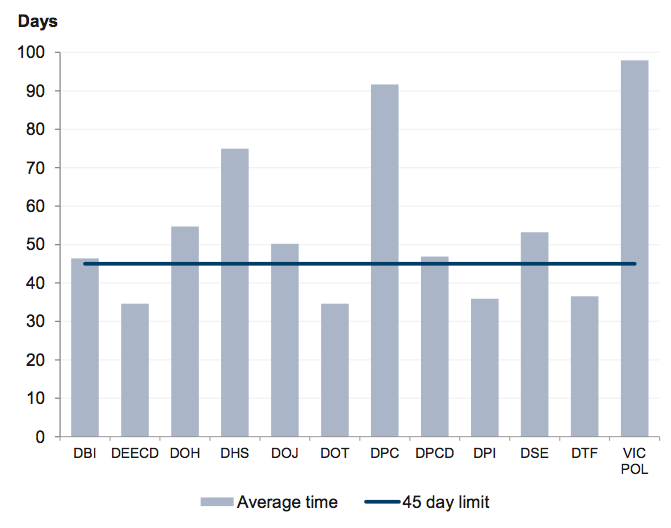
Source: Victorian Auditor-General’s Office.
Figure 3B shows where agencies have met the statutory time limit (Y) and where they have not (N). It reveals that:
- DEECD and DPI have been the strongest performing agencies over the past five years
- Victoria Police and DHS have been among the worst performing agencies
- DOJ, despite being the lead agency for FOI, has an average response time that exceeded the 45-day limit in each of the past three financial years.
Figure
3B
Agencies’ adherence to the 45-day limit
Agency |
2006–07 |
2007–08 |
2008–09 |
2009–10 |
2010–11 |
|---|---|---|---|---|---|
Department of Business and Innovation |
Y |
N |
N |
Y |
N |
Department of Education and Early Childhood Development |
Y |
Y |
Y |
Y |
Y |
Department of Health |
N |
N |
N |
N |
N |
Department of Human Services |
N |
N |
N |
N |
N |
Department of Justice |
Y |
Y |
N |
N |
N |
Department of Planning and Community Development |
N |
N |
N |
N |
N |
Department of Premier and Cabinet |
Y |
Y |
Y |
N |
N |
Department of Primary Industries |
Y |
Y |
Y |
Y |
Y |
Department of Sustainability and Environment |
Y |
Y |
Y |
N |
N |
Department of Transport |
N |
Y |
N |
Y |
Y |
Department of Treasury and Finance |
Y |
Y |
N |
Y |
Y |
Victoria Police |
N |
N |
N |
N |
N |
Source: Victorian Auditor-General’s Office.
Requests fulfilled within 45 days
It is also important to consider the percentage of requests processed within the 45-day time limit when assessing the consistency of performance. In 2010–11:
- the strongest performers were DEECD, DTF and the Department of Business and Innovation (DBI)—these agencies respectively processed 99 percent, 90 percent and 89 percent of their requests within 45 days
- the worst performers were DPC and Victoria Police—these agencies respectively processed 31 per cent and 34 per cent of their requests within 45 days.
Agencies’ performance is outlined in Figure 3C.
Figure
3C
Timeliness of FOI requests completed by agency 2010–11
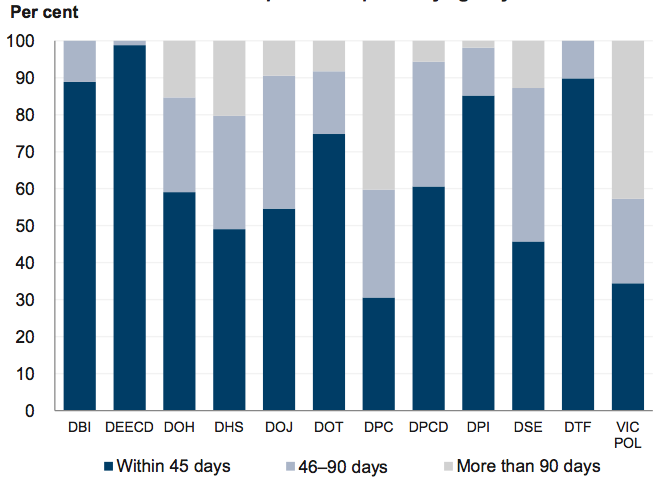
Source: Victorian Auditor-General’s Office.
Further analysis of agencies’ performance with regard to timeliness and other benchmarks can be found in Appendix A.
3.3.2 Better practice comparison
Timeliness is clearly an issue for Victorian agencies. However, Victoria’s underperformance against its own legislation is even more concerning when compared with the performance of other states.
New South Wales, the Commonwealth, South Australia, Queensland and Tasmania all have shorter standard statutory processing time frames than the 45 calendar days permitted in Victoria. Extensions may be granted in certain circumstances.
New South Wales’ processing time is 20 business days with an extension of up to 15 days in some circumstances. Its level of compliance in 2010–11 was significantly better than the equivalent agencies in Victoria:
- The New South Wales Police Force complied with the permitted time limit in 97 per cent of cases in 2010–11, despite handling approximately three times more requests than Victoria Police.
- The New South Wales Department of Family and Community Services complied in 93 per cent of cases in 2010–11, while handling half the number of requests of DHS in Victoria.
- The New South Wales Department of Premier and Cabinet complied in 81 percent of cases.
3.3.3 Causes of delays
The time agencies take to respond to applicants can vary according to the nature of requests and the resources available to manage them. These factors can create variability in performance standards and make it more difficult for management to monitor that performance.
It is nonetheless incumbent on agencies to understand the causes of delays and to take appropriate remedial action. With the exception of DHS and DOH’s shared FOI unit and—prompted in October 2011 by this audit—the Department of Planning and Community Development (DPCD), the audited agencies do not monitor the time taken to complete each stage of the FOI process. Without analysing the time taken to complete each step, it is difficult for agencies to identify and remedy the main causes of the delays.
3.4 Ministerial noting
The FOI Guidelines require FOI officers to brief ministers on sensitive requests. However, the FOI Guidelines also state that responsibility for FOI decisions rests with the FOI officer making the decision.
Although it is appropriate for agencies to keep ministers informed of matters relevant to their portfolio, this practice increases the risk of actual, or perceived, political influence on the FOI officer’s decision. It therefore warrants agencies’ close attention and proactive management.
3.4.1 Adherence to noting period time lines
According to the FOI Guidelines, the ministerial noting period should be five business days. The purpose of this time limit is to reduce the risk of information being deliberately delayed to minimise its political impact, for example, withholding information until after an election or until a topic is no longer of public interest.
Of the 12 audited agencies, on average, only DEECD, DPCD, DPI and Victoria Police adhered to the FOI Guidelines. The worst performers were DOH (20 days), DHS (25 days) and DPC (41 days). Long delays in noting may create the perception that there are attempts to exert political influence on the FOI process.
Even those agencies that are meeting the 45-day statutory time limit to respond to requests should demonstrate responsiveness to the community by adhering to the five day ministerial noting period. It is not acceptable practice for agencies to disregard the FOI Guidelines. The FOI officer has already made a decision on the request when the response is forwarded to the minister for noting. Extending the noting period is therefore inappropriately prolonging the length of time taken to respond to the public. The Act requires applicants to be informed of decisions ‘as soon as practicable’, even if this is before the 45 days have elapsed.
Principal officers need to develop appropriate strategies to mitigate the perception of improper influence on the FOI process by reinforcing the independent role of their FOI unit and routinely releasing documents on day six.
3.4.2 Ministerial noting at the Department of Premier and Cabinet
DPC’s Legal Branch advised the secretary on 31 August 2011 of delays in noting by the Office of the Premier. Attached to the briefing was a log containing details of the department’s current FOI requests. Of the 36 active FOI requests on this log, 13 were with the Office of the Premier for noting. DPC’s briefing stated that the Office of the Premier was taking significantly longer than the five day noting period, which was contributing to processing delays.
Although it is correct that the noting period was being exceeded, analysis of the log attached to the briefing revealed that DPC had contributed to the greater part of the delays, as shown in Figure 3D.
Figure
3D
Log of requests with the Office of the Premier on 31 August 2011,
showing elapsed time
Number of days |
||||
|---|---|---|---|---|
Type of request |
Since request was received |
Overdue |
With DPC |
With the Office of the Premier |
Media |
262 |
217 |
218 |
44 |
MP |
250 |
205 |
206 |
44 |
Media |
242 |
197 |
198 |
44 |
Personal/other |
240 |
195 |
196 |
44 |
Media |
219 |
174 |
175 |
44 |
Media |
178 |
133 |
130 |
48 |
Media |
163 |
118 |
122 |
41 |
Personal/other |
149 |
104 |
136 |
13 |
Media |
122 |
77 |
54 |
68 |
MP |
102 |
57 |
53 |
49 |
Media |
93 |
48 |
84 |
9 |
Media |
78 |
33 |
34 |
44 |
Media |
56 |
11 |
12 |
44 |
Source: Victorian Auditor-General’s Office.
On average these 13 requests were 121 days overdue. In 11 cases, the request had been with the Office of the Premier for more than 40 days. In three cases, the request had been with the Office of the Premier longer than the department.
Agencies should release documents on day six, unless the minister’s office has communicated a valid reason not to release this information.
Selected requests were reviewed from DPC’s log. The case study in Figure 3E relates to one of these requests.
Figure
3E
Interaction between the Department of Premier and Cabinet
and the Office of the Premier
Date |
Days overdue |
Action |
|---|---|---|
28 April 2011 |
0 |
DPC received a request from a journalist for marketing and public affairs costs for ‘all departments employed by the Victorian Government’ and ‘State Government Ministers’. The journalist requested a summarised document or table of the above information pursuant to section 19 of the Act. |
13 June 2011 |
0 |
The decision was due. |
21 June 2011 |
8 |
DPC provided a brief to the Office of the Premier advising that it intended to release a summarised document of DPC’s marketing and public affairs costs. DPC did not have the information for other departments or ministers. |
22 June –5 July 2011 |
22 |
The Office of the Premier queried whether DPC’s interpretation of the request was correct. DPC agreed to seek legal advice. |
6 July 2011 |
23 |
DPC asked the Victorian Government Solicitor’s Office (VGSO) to ascertain whether:
|
8 July 2011 |
25 |
VGSO advised DPC that providing a ‘no documents’ response it was not an option because DPC held some documents relevant to the request and it was requested to generate a summarised document. The advice stated ‘interpreting “all” to mean “all or nothing” could be criticised as adopting an overly technical and captious approach to the request'. |
15 July 2011 |
32 |
Following further consultation with the Office of the Premier, DPC sought a second legal opinion from counsel chosen jointly by DPC and the Office of the Premier. |
21 July 2011 |
38 |
Legal counsel confirmed VGSO’s advice. |
22 July – 4 September 2011 |
83 |
DPC sent the FOI decision back to the Office of the Premier for noting. |
5 September 2011 |
84 |
DPC sent a decision letter and copy of the summarised document to the journalist. The response to the applicant was in the form originally proposed by DPC. |
Source: Victorian Auditor-General’s Office.
3.5 Training
FOI officers underpin the administration of the legislation. They make decisions on behalf of senior management and are vital to the effective and efficient operation of the Act. It is therefore critical they receive adequate support, such as training, to enable agencies to meet their statutory obligation to provide appropriate and timely responses to the public. Principal officers are responsible for providing their FOI officers with this support.
3.5.1 Agencies’ training
As discussed in Part 2, DOJ provides basic introductory training for FOI officers. However, it is incumbent on agencies to train FOI officers on the processes and practices that are unique to their agency.
While the small number of FOI requests received by some agencies mean it would not be cost effective for all agencies to implement tailored training, agencies may consider combining their training programs with other agencies’.
DHS recently engaged the services of a private consultant to deliver FOI training that was tailored to its needs. The four days of training helped FOI officers understand DHS’s business procedures and practices. This contractor also produced FOI Practice Notes for DHS. This approach should improve consistency in the application of FOI processes across the DHS team.
3.5.2 Training for other staff
Training on FOI principles and statutory requirements is important not only for FOI officers themselves, but also for those agency employees that FOI officers rely on in order to perform their statutory functions under the Act.
Agency staff search for documents relevant to FOI requests and provide FOI officers with contextual advice as required. These staff therefore need to understand the requirements and intentions of the Act to be able to respond appropriately to requests.
However, this understanding is not embedded in all agencies. DPC and Victoria Police have both experienced issues with inadequately trained staff outside the FOI unit:
- An internal audit of DPC’s FOI processes and controls from September to October 2011 revealed that there was a lack of understanding of FOI processes among departmental staff.
- Victoria Police’s FOI unit has experienced difficulties with police officers editing documents or not providing them in full to the FOI officer.
This lack of understanding has the potential to delay the search process, which impacts agencies’ ability to meet the statutory time frame, or to restrict the amount of information released.
Principal officers should therefore confirm that all employees understand their obligation to assist the FOI process and should promote training as a means of improving practices and culture.
Better practice training
DBI runs a comprehensive FOI training program that raises awareness of FOI throughout its organisation.
DBI’s monthly training sessions are provided to all staff, including executive officers, to promote compliance and cooperation at senior levels. DBI advised that ‘it was recognised that, for the proper administration of FOI, the department must ensure that all of its staff, including the ‘gatekeepers’ of information, must be properly versed in the department’s FOI responsibilities’.
The Department of Sustainability and Environment also runs FOI training for its grade five and six officers and to new staff.
Another option agencies could consider is assessing the feasibility of rotating staff through the FOI unit as a development opportunity. Although there will be inefficiencies as new staff take time to learn the processes, this approach may improve the culture around FOI by encouraging better practices and fostering better understanding of FOI in the public sector.
3.6 Decision review
In the 12 audited agencies, internal reviews upheld 79 per cent of appealed decisions in 2010–11. However, it is unknown how many FOI applicants are dissatisfied with the outcome of their request but choose not to appeal the decision.
Of the 35 cases that were decided by the Victorian Civil and Administrative Tribunal (VCAT) in 2010–11, 33 decisions were upheld in favour of the agencies. However, these statistics do not include the number of cases that were withdrawn from VCAT. In 2010–11, 87 cases were withdrawn. DOJ is unable to confirm how many applicants received the documents they were seeking prior to the VCAT application being withdrawn, and what delay this had on the provision of the documents.
Recommendations
-
Principal officers should:
- promote the appropriate ‘tone at the top’ with regard to the object of the Freedom of Information Act 1982
- monitor their performance against the requirements of the Freedom of Information Act 1982, the Attorney‑General’s Guidelines on the Responsibilities and Obligations of Principal Officers and Agencies and related policies and procedures, identify areas of underperformance or non-compliance and remedy any shortcomings
- review the support and guidance they provide to confirm their agency is meeting its obligations under the Freedom of Information Act 1982.
- Agencies should:
- seek to continually improve their processes to comply with the 45-day statutory time limit for processing freedom of information requests.
- routinely release information on day six of the ministerial noting period.
- The Department of Justice should drive continuous improvement by, in the longer term, giving consideration to adjusting the statutory time frame in line with other Australian jurisdictions.
4. Department of Human Services
At a glance
Background
This audit conducted a detailed analysis of the Department of Human Services' (DHS) freedom of information (FOI) processes and performance. DHS received 1 047 requests in 2010–11, or 21 per cent of the 12 audited agencies’ FOI requests.
Conclusion
DHS is not administering its information management and FOI processes appropriately. While DHS has made attempts to improve responsiveness, its practices remain deficient in many areas. As a consequence, the public is being denied access to information.
Findings
- Poor records management is having a negative impact on the processing of FOI requests and the subsequent release of information to applicants.
- DHS is inappropriately excluding records held by its community service organisations from the FOI process.
- DHS is inappropriately offering to waive processing charges of applicants who have little or no money in exchange for clients waiving the 45-day time limit. The Freedom of Information Act 1982 does not allow agencies to charge those clients fees.
Recommendations
The Department of Human Services should:
- improve its record management practices to minimise loss of documents and enhance access to information
- cease using section 22(6) for clients who have little or no money and are seeking their own records
- include community service organisations’ records when processing FOI applications.
Agencies should review the findings relating to DHS and apply lessons where necessary in their own organisation.
4.1 Introduction
Of the 1 047 freedom of information (FOI) requests received by the Department of Human Services (DHS) in 2010–11, 93 per cent were from private individuals. Private individuals are unlikely to be familiar with agency FOI processes and consequently require DHS’s assistance so their needs can be met on a timely basis.
From August 2009 to October 2011, the average number of pages for finalised FOI responses by DHS was:
- 484 pages for personal requests
- 278 pages for Member of Parliament (MP) requests
- 49 pages for media requests
- 109 pages for other types of requests.
DHS created the Family Information Networks and Discovery (FIND) unit to help people access personal and family information about adoption, donor conception and wards of the state prior to 1986. In 2005, the statutory responsibility for FOI services to former wards was transferred to FIND.
FIND processes approximately 50 per cent of the total FOI requests received by DHS. The remaining requests are processed by DHS’s Corporate Integrity, Information and Resolutions unit (CIIRu).
This Part assesses the appropriateness of DHS’s FOI processes.
4.2 Conclusion
An effective FOI system relies on a robust understanding of the Freedom of Information Act 1982 (the Act), good records management, appropriately defined searches and open communication with applicants. Although DHS has recently made attempts to improve its responsiveness to applicants’ needs, it has significant deficiencies in all four of these areas. Consequently, the public is being denied access to information.
DHS has seriously misinterpreted elements of the Act that relate to charging access fees, exploiting some of the most vulnerable members of society. In particular, CIIRu’s practice of not advising clients who have little or no money of their rights to access information about themselves at no cost is unacceptable and should cease immediately.
DHS's record keeping practices are below acceptable standards and records at DHS’s storage facility are at risk of being lost, disposed of incorrectly or rendered inaccessible.
DHS has inappropriately excluded information held by external service providers from its FOI searches, denying members of the public their full entitlement to access information that should be available to them.
4.3 Charges waived in return for extension of time
The Act specifies the conditions under which processing fees do not apply in the FOI process:
- Agencies may reduce fees if the applicant agrees to waive the 45-day processing time limit. This gives agencies more time to respond to the request.
- Agencies are not permitted to charge fees if applicants have little or no money and are seeking their personal information. Approximately 79 per cent of DHS’s requests fall into this non-fee paying category.
4.3.1 Applicability of charges
CIIRu’s FOI application request form includes an option for applicants to waive the 45‑day time limit in return for a potential reduction in access charges. However, the form does not properly explain that some clients do not have to pay fees, even if they do not waive the 45-day time limit. The lack of clear communication means that applicants are giving up their right to timely access, unaware they are entitled to receive the information within the 45-day time limit.
DHS inappropriately considers that applicants seeking personal information should pay processing fees if their files contain the personal information of other people. Although the Act is not explicit on this point, DHS was unable to provide legal advice to support its position. DHS’s approach is overly technical and contrary to the spirit of the Act.
DHS’s poor communication and misinterpretation of the Act is adversely affecting their disadvantaged clients. The case study in Figure 4A is typical of the experiences of DHS clients, and demonstrates how DHS’s approach is disadvantaging them.
Figure
4A
Response to a client seeking her own records
An applicant requested her child protection and youth justice files. She was on a Centrelink Youth Allowance. Due to the applicant’s financial circumstances, and the fact she was requesting her own information, under the Act, DHS was required to waive the application fee, search fee and photocopying charges regardless of whether she agreed to waive the 45-day processing time.
DHS did not advise her of this and instead she requested the fees be waived in return for waiving the 45-day limit. The acknowledgement letter from DHS simply stated that ‘the fees and charges have been waived in this instance’.
DHS subsequently advised that the document search had been completed and that she would be contacted again to discuss an anticipated completion date. This took place 164 days after DHS had received her application, 119 days after the response should have been provided.
The applicant was unnecessarily made to wait far longer than she should have for this information. Furthermore, DHS did not record this response as exceeding the 45-day time limit, which inappropriately improved its timeliness performance.
Source: Victorian Auditor-General’s Office.
FIND does not charge application fees to former ward of state applicants.
4.3.2 Misreported timeliness performance
When an applicant agrees to waive the time limit, DHS does not include the request in its monthly overdue figures. This information is included in DOJ’s monthly report to principal officers—secretaries and chief operating officers of agencies— on the State Coordination and Management Council. DHS's approach presents a misleading picture of its timeliness performance, starting in January 2011.
Figure 4B shows the impact on reporting.
Figure
4B
Department of Human Services active and overdue FOI requests
April 2010 – September 2011
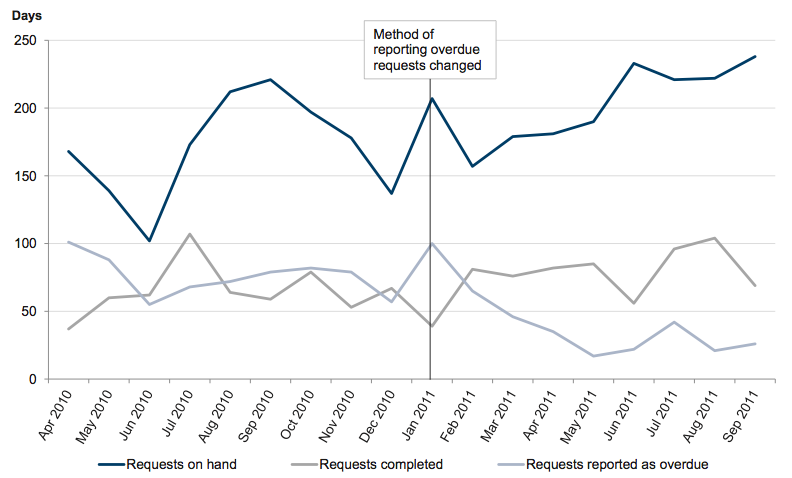
Source: Victorian Auditor-General’s Office.
Between January 2011 and September 2011, a total of 215 FOI applicants agreed to waive the time limit. During this period, DHS reported a substantial decrease in its overdue requests. However, over the same period, the number of requests increased and there was no significant improvement in the number of requests completed.
The reported decrease misrepresents DHS’s actual timeliness performance. DHS was unable to provide figures on the actual number of requests on hand at the end of each month that were older than 45 days.
4.4 Prioritisation of requests
Prioritising FOI requests for processing is necessary because applicants have different needs. Some require documentation urgently for various reasons, some are attempting to reunite with family members, and others, such as the media or MPs, require documentation on matters of current public interest.
DHS’s FOI unit consists of two teams, split into ‘personal’ and ‘non-personal’ applications. Non-personal requests are predominantly lodged by MPs and the media and are typically considered more complex than personal requests. DHS’s structure appropriately matches risk and expertise because its more experienced staff handle the non-personal, complex requests. This has improved its timeliness performance.
DHS’s FOI unit prioritises FOI requests according to:
- the urgency of the application, for example due to a court case or child death
- how long the request has been on hand
- how likely the applicant is to take their case to the Victorian Civil and Administrative Tribunal (VCAT)
- the priorities of the program area, secretary and minister
- whether the applicant has complained—known as ‘squeaky wheel management’
- whether the request is small and can be completed quickly.
Only the first two reasons are appropriate reasons to prioritise requests. Furthermore, DHS does not confirm all urgent applications are being appropriately prioritised.
In one case, DHS’s FOI unit advised an applicant that their application could not be fulfilled by the upcoming court date, which was scheduled to take place ‘one to two months’ after the application lodgement. DHS told the applicant that it would be better for them to summons the information and the applicant withdrew their request. DHS’s FOI unit made no attempt to either ascertain from the applicant the exact date of the hearing or contact the relevant program area in the department to determine how many documents were involved in the request.
4.5 Search parameters
DHS engages community service organisations (CSO) to provide functions such as emergency accommodation and child protection support services. The CSOs are responsible for maintaining and disposing of their client records, subject to the Privacy Act 2000.
4.5.1 Community service organisations’ records
DHS is not carrying out sufficiently broad searches for information requested under the Act because it is not including records held by its service providers. Consequently, the public is being denied access to information that should fall within the scope of FOI requests.
DHS mistakenly considers that because it does not create, receive or store its CSOs’ records, these records are not subject to DHS’s obligations under the Act. DHS instructs clients of CSOs who want to access their records to approach the CSO directly. This practice is problematic as each CSO has different release-of-information and record keeping practices. Consequently, the amount of information clients obtain varies according to the CSO that provided the outsourced service.
DHS’s current practice is inappropriate and contrary to the Act, DOJ guidance and its own FOI procedures manual:
- The Act applies to documents that are ‘in the possession of an agency [...] whether created in the agency or received in the agency. The service agreement between DHS and CSOs gives DHS a legal right to possess CSO documentation. This is known as ‘constructive possession’.
- DOJ’s Practice Note 5 recommends that, ‘where government agencies engage non-government entities to carry out functions prescribed by statute, they ensure the contract terms give the agency a right of access to documents produced in the course of performing those functions. [...] In this way, FOI access should be available as if the function was being performed directly by the agency’.
- DHS’s FOI procedures manual states that if DHS ‘can demand that a document be delivered to it, then it is deemed to have possession of that document and is thus obliged to obtain the document from that external source and process the request seeking access to that document’.
All clients should be able to access the same amount of information, regardless of the service provider. As DHS engages CSOs to perform services on its behalf, any request to DHS for records held by these service providers should be included in FOI searches. Any other course of action is not only contrary to legislation and standards, but also contrary to the Code of Conduct for Victorian Public Sector Employees, which requires agencies and their staff to provide high quality services to the community.
DHS advised it does not process CSO documentation because lines of accountability are unclear, and there is a lack of time and resources.
Accountability
DHS’s position is that the line of accountability for CSO documentation is blurred because some CSOs also receive funding from other sources, such as the federal government, donations and fundraising.
However, if the agency is providing a service on behalf of DHS, then DHS is responsible for the documentation. DHS’s position conflicts with the operations of open and transparent government.
Time
DHS advised that it would be difficult and time consuming for its FOI unit to process such requests as clients often have complex needs and consequently have often accessed multiple CSOs. DHS’s current practice requires clients to approach multiple CSOs to access their information, rather than DHS locating the information for them.
DHS’s approach does not make the dissemination of information as easy as possible for its former and current clients. This is contrary to the spirit of the Act and undermines the public sector values of responsiveness and accountability that are set out in the Code of Conduct for Victorian Public Sector Employees.
Resources
DHS advised that the resources required to search CSOs’ records would be untenable, as it ‘would require a significant resource allocation to advise, train and provide a quality assurance mechanism to ensure compliance’.
If this is the case, DHS could renegotiate its contractual arrangements with the CSOs to enable search tasks to be performed appropriately. A lack of resources is not a valid reason for DHS to contravene its statutory obligations under the Act, or to unilaterally disregard the Attorney-General’s Guidelines on the Responsibilities and Obligations of Principal Officers and Agencies.
Department of Health
The Department of Health (DOH) has similar contractual agreements in place with community service organisations. The department has advised that, like DHS, it excludes these records when processing FOI applications. DOH is also, therefore, contravening its statutory obligations.
4.6 Records management
The storage and management of records affects agencies’ ability to locate information in response to FOI applicants’ requests.
DHS records are stored at a facility in Melbourne’s central business district and in commercial storage, at a total annual cost of $1.75 million. DHS’s facility has over 28 kilometres of shelves that store records that are up to 150 years old, at an annual cost of $1.35 million. A further $0.4 million per annum is spent on fit-for-purpose commercial storage.
4.6.1 Records storage facility
DHS’s record keeping practices are below acceptable standards. Records at DHS’s storage facility are at risk of being lost through inappropriate physical storage conditions, or being irretrievable due to significant problems with indexing.
Storage risk
Despite the age and fragility of some of the records, there is no climate control system. In the case of a fire, these records are at risk of being destroyed, either by the fire itself or the facility’s water sprinklers.

A fragile Department of Human Services’ ward of the state record book.
Indexing
DHS’s storage facility is in disarray and its search system is unnecessarily complex. The type of search required depends on the age and type of record requested, as multiple indexing systems are used within the facility. For example, Office of Housing tenancy records are contained randomly in numbered boxes. In order to search for an Office of Housing record, DHS must search through a folder that contains pages of random record references and, only when the reference is found, can the corresponding box location be ascertained.

An example of a basic Department of Human Services’ record index
4.6.2 Weaknesses in the records management system
From January 2008 to December 2010, 21 per cent of DHS’s ward of the state hardcopy records could not be located in response to FOI requests. This figure represents 389 clients who were not able to access personal information. The ongoing trauma experienced by many such ‘Forgotten Australians’ is well documented. Former wards report that, because they grew up without their families, they require their records to develop reference points in their lives such as family traits and likenesses.
The case study in Figure 4C demonstrates the impact DHS’s poor record keeping has on FOI.
Figure
4C
Personal files misplaced by the Department of Human Services
For many years records relating to a particular boys’ home, where some wards of the state were housed, could not be found at DHS’s records storage facility. DHS believed these records were no longer in existence. Consequently, while applicants received their ward files, no additional records regarding this boys’ home were able to be provided. Recently, a number of records relating specifically to this boys’ home were located at DHS’s records storage facility. FIND has since received a number of requests for these records, which have subsequently been provided to these applicants.
Source: Victorian Auditor-General’s Office.
These issues are wide ranging, as DHS estimates 90 per cent of its documents are not properly managed as records. Since DHS does not have a robust record keeping system, records are stored in network drives, hard drives, portable devices and emails. Records that have not been managed in accordance with better practice are difficult to locate, requiring more resources to search for them. In some cases these records cannot be located.
Acknowledging the issues with its records management, DHS’s Corporate Services Division submitted a request for funding in May 2011. The request sought $8.16 million initially and a further $448 000 per annum thereafter to establish and maintain an electronic document and records management system (EDRMS).
An EDRMS can improve access to information, safeguard the corporate memory and minimise the risk that documents are lost as a result of a disaster or movement of staff. Although there were factual inaccuracies in the EDRMS business case, it did correctly state that DHS lacks a strong information management culture, and manages its information in an ad hoc and inconsistent manner.
The request for funding was denied. The issues regarding DHS records and subsequent impact on FOI requests therefore remain unresolved.
4.7 Interaction with clients
DHS has implemented three measures to improve its service delivery for clients—employing specialist staff, surveying clients, and notifying clients of their rights if the response to their request will be delayed.
DHS has employed FOI officers with a background in child protection who are experienced users of the department’s child protection database. These officers contact applicants to clarify what information they wish to obtain and make suggestions about what documents would satisfy their needs. This approach helps identify the specific information clients want access to and reduces the amount of time FOI officers spend unnecessarily searching for and reviewing documents.
FIND surveys its clients to gauge the level of satisfaction with the service provided by the case workers and the outcome from their request. FIND also asks for suggestions on how to improve its service. Although the response rate is low, the FIND unit has used client feedback to improve the clarity and relevance of its publications and decision letters.
In his 2006 review of the Act, the Ombudsman recommended that agencies notify applicants of their rights to apply to VCAT upon the expiration of the 45-day time limit, and to complain to the Victorian Ombudsman. DHS accepted the Ombudsman’s recommendation and notifies applications of expected delays, on, or around, day 40. DHS also provides detailed information regarding the right to apply to VCAT for a decision or to complain to the Ombudsman.
Recommendations
-
The Department of Human Services should:
- improve its record management practices to minimise loss of documents and enhance access to information
- cease its practice of using section 22(6) for clients who have little or no money and are seeking their own records
- include community service organisations’ records when processing freedom of information applications
- improve its method of prioritising freedom of information requests.
-
Agencies should review the findings relating to the Department of Human Services and apply lessons where necessary in their own organisation.
5. Victoria Police
At a glance
Background
This audit conducted a detailed analysis of Victoria Police freedom of information (FOI) processes and performance. Victoria Police received 2 381 requests in 2010–11, or 47 per cent of the 12 audited agencies’ FOI requests. Of the 2 381 requests, 79 per cent were personal requests.
Conclusion
Victoria police is not meeting its obligations under the Freedom of Information Act 1982 due to serious failures of senior management. As a consequence, applicants are not receiving the information to which they are entitled, in a timely manner.
Findings
- Victoria Police has not met the FOI statutory time limit between 2006–07 and 2010–11.
- Staff numbers and work practices influence timeliness performance.
- Victoria Police does not adequately store official records.
- Victoria Police is inappropriately narrowing searches for documents.
- Victoria Police does not adequately communicate applicants’ appeal rights.
Recommendations
Victoria Police should:
- improve its record management practices to minimise loss of documents and enhance access to information
- improve its responsiveness by reviewing its work practices in the first instance, and then, if necessary, considering the resources of its FOI unit
- appropriately scope FOI requests
- inform FOI applicants of their review rights.
Agencies should review the findings relating to Victoria Police and apply lessons where necessary in their own organisation.
5.1 Introduction
Victoria Police received 2 381 freedom of information (FOI) requests in 2010–11. This represents 47 per cent of the total requests received by the 12 agencies reviewed in this audit.
This Part assesses the appropriateness of Victoria Police’s FOI processes.
5.2 Conclusion
Victoria Police is not meeting its obligations under the Freedom of Information Act 1982 (the Act) with regard to timeliness, completeness of searches, and communication with applicants. Senior management have an obligation to address Victoria Police’s contravention of the Act as a priority.
Victoria Police’s average response time did not meet the 45-day statutory limit during any month in the five years of data reviewed. Staffing and the efficiency of processes have both had an impact on timeliness.
Victoria Police’s record keeping practices for police note books are below acceptable standards. Information is not stored securely, which means FOI searches are not able to locate all of the information relevant to the request. The information released to the public is, therefore, incomplete.
The amount of information released is also affected by how FOI officers interpret and scope requests. Where search parameters have been applied too narrowly, the amount of information returned to applicants has been reduced. This is contrary to the spirit of the Act.
Victoria Police does not adequately inform FOI applicants of their right to apply to the Victorian Civil and Administrative Tribunal (VCAT) for a decision, or to make a complaint to the Victorian Ombudsman when a request is not finalised within 45 days.
5.3 Timeliness
Victoria Police has had longstanding difficulties complying with the 45-day statutory time limit to complete FOI requests.
The timeliness performance of Victoria Police was particularly poor in 2006–07, with the number of overdue requests reaching 392 in August 2006. The average time to complete requests peaked at 225 days in January 2007.
To address these longstanding performance concerns, Victoria Police reviewed its FOI processes in 2006. The review found that, while the level of resourcing may be a factor in timeliness, procedures and work practices within the unit could have been more efficient. The report recommended formalising the unit’s structure and enhancing procedures. An additional six FOI officers were also employed between November 2006 and January 2007 to process the backlog of requests.
Following the implementation of these measures, Victoria Police reduced the number of overdue requests by 78 per cent to 88 requests in February 2009. The average time taken to complete an FOI request was reduced by 72 per cent to 62 days.
After the Black Saturday bushfires of February 2009, over half of the staff in the FOI unit were temporarily transferred to the State Coroner’s Office to assist with victim identification. The need to reassign these staff members is not in dispute. However, the reduction in staff did have an immediate adverse effect on the timeliness performance of Victoria Police’s FOI unit. The FOI backlog peaked in September 2010 at 487 overdue requests and 742 active requests.
As the number of active requests accumulated, management attempted to address the issue by employing additional staff. A business case to appoint additional staff was submitted to senior management in July 2010 and four additional FOI officers were appointed in November 2010. With the addition of these extra FOI officers, Victoria Police reduced the backlog to 172 overdue requests and achieved an average completion time of 84 days in July 2011.
Timeliness performance has since worsened following planned and unplanned leave, staff turnover and the discontinuation of funding for temporary FOI positions.
Figure 5A demonstrates the impact that staffing has had on the timeliness performance of Victoria Police from January 2006 to December 2011.
Figure
5A
Victoria Police FOI requests January 2006—December 2011
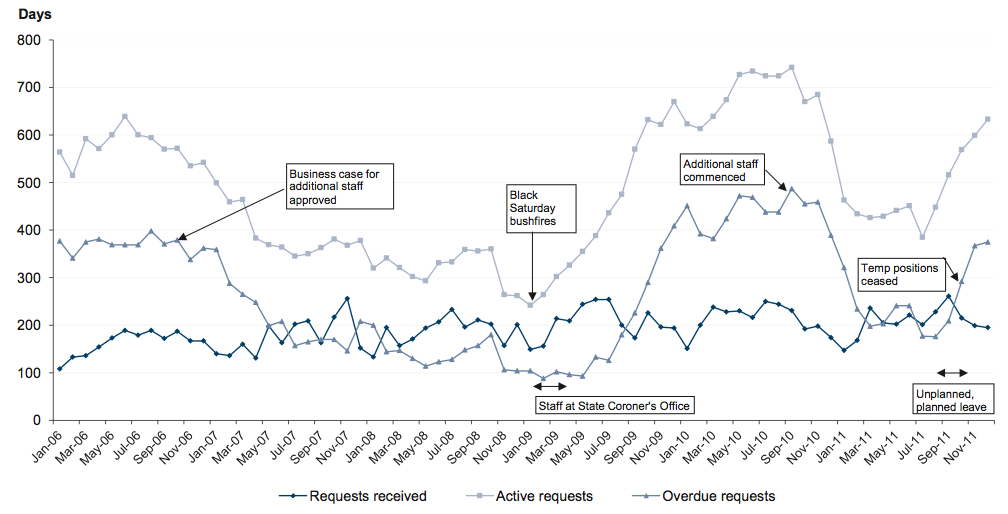
Source: Victorian Auditor-General’s Office.
Timely performance is not simply attributable to staff numbers. The ability and experience of individual staff members, the culture and leadership in the organisation and the efficiency of processes also play a part.
The most extensive delays in Victoria Police’s FOI process occur at the document assessment stage, which is when FOI officers review the documents produced in response to searches.
Of the 60 case files reviewed in this audit, the average assessment time was 48 days. However, in one instance Victoria Police took 246 days to assess documents that would support a victim’s application to the Victims of Crime Assistance Tribunal.
There is an opportunity for Victoria Police to improve efficiency by providing clearer information on its website about the types of information that is released outside of the Act and where to obtain it. For instance, motor vehicle accident information can be purchased outside of the Act and information for court proceedings can be obtained through subpoenas. Clearer communication would reduce the number of requests for these types of information that are currently incorrectly made under FOI.
The Attorney-General’s Guidelines on the Responsibilities and Obligations of Principal Officers and Agencies state that the heads of agencies should allocate sufficient resources to process their FOI requests within legislative time lines.
Victoria Police’s unsatisfactory timeliness performance warrants a review of processes and resources.
5.4 Records management
As already noted in Part 4, the storage and management of records affect an organisation’s ability to appropriately respond to FOI requests.
The Victoria Police Manual and Procedures provides instructions on how to use and store records. Victoria Police officers use one or more of the following to record details of their work related activities:
- a diary—where a police officer is issued with a diary, it is compulsory to complete. The diary must be stored at the officer’s station and is audited fortnightly by the Officer in Charge. All detectives use diaries
- a note book—this is a police officer’s record of work activities. Note books remain the property of Victoria Police
- a running sheet—at the end of each shift uniformed police officers must complete and submit to their station a running sheet that contains a record of their shift activities.
An officer’s notes are an official record of Victoria Police because they are taken for the purposes of performing official duties. These documents should therefore be stored securely in line with Public Records Office of Victoria (PROV) standards.
The actual practice of police officers does not comply either with the Victoria Police Manual and Procedures or PROV standards. Victoria Police officers keep their note books with them, regardless of whether they move station or, in some instances, leave Victoria Police. Some officers even store note books at home.
Storing these records at home hinders FOI procedures, increases the likelihood that a record cannot be obtained or will be lost, and is a breach of privacy.
The difficulties with Victoria Police’s storage and retention practices are highlighted in the case study in Figure 5B.
Figure
5B
Victoria Police document destruction
In 2011 an applicant applied for access to documentation regarding an interview conducted with the individual by Victoria Police in 2008. The applicant had made serious allegations against members of the Australian Defence Force in the interview.
The relevant police member advised the FOI unit that he had written a report on the allegations and forwarded it to the Royal Australian Navy to advise them of the allegations. The police member said that he did not have a copy of the report because he had cleared his computer hard drive.
The FOI unit did not request proof from the police member that the document had been destroyed, such as an approval from Victoria Police’s Records Destruction Unit. Consequently, the FOI unit wrote to the applicant, advising them that the report had been destroyed in accordance with PROV standards. This was misleading.
The case demonstrates a casual approach to record keeping and destruction. These practices inappropriately restrict the public’s ability to access information.
Source: Victorian Auditor-General’s Office.
5.5 Narrow response to requests
Requests for general types of information are not valid under the Act. Applicants may therefore require assistance to clarify the wording of their request, or identify the documents that will meet their needs. Effective engagement with applicants can avoid inappropriate exemptions being applied and better satisfy applicants’ requirements.
The example provided in Figures 5C demonstrates a request being inappropriately narrowed by Victoria Police.
Figure
5C
Victoria Police interpretation of an applicant’s request
An applicant lodged a request with Victoria Police for Law Enforcement Assistance Program (LEAP) database records and statements to police regarding an assault. The FOI unit conducted a search for those documents.
However, only LEAP records were provided, as no statements were taken in relation to the assault. The FOI unit did not notify the applicant that Victoria Police possessed running sheets and notes on the assault as the unit considered these documents to be outside the scope of the request.
Source: Victorian Auditor-General’s Office.
Applying a narrow interpretation to applicants’ requests is inappropriate and inconsistent with the intent of the Act.
Victoria Police advised that collecting and assessing additional documents would delay the process and would not lead to the disclosure of further information, as LEAP entries are summaries of running sheets and notes.
In the case study outlined in Figure 5C, the FOI unit was supplied with the running sheets and notes at the same time as the LEAP report. The running sheet contained more details on the incident than the LEAP report.
Victoria Police also advised that the additional documentation may be exempt if it contained the personal details of third parties, and that it would therefore be of little use to tell the applicant of its existence.
The Act requires FOI officers to assist applicants with their requests. Although an applicant may not name specific documents, it is inappropriate to exclude those documents from the scope of the request. Whether the applicant wishes to have those documents assessed for release is a matter for the applicant to decide, not the FOI officer.
Three examples of this inappropriate practice were noted, or 5 per cent of the 60 case files reviewed.
The exclusion of documents from the scope of a request by an FOI officer means the applicant may not be aware these documents exist. This is concerning as it precludes an applicant from requesting a review of the non-disclosure.
5.6 Right to complain and appeal
The Attorney-General’s Guidelines on the Responsibilities and Obligations of Principal Officers and Agencies state that if a delay is likely to occur, agencies should advise applicants of the anticipated release date for their request, and also inform them of their right to apply to VCAT for a decision and to make a complaint to the Victorian Ombudsman.
When an agency does not notify an applicant of a decision by the 45-day time limit, section 53 of the Act allows the applicant to apply to VCAT for a decision to be made on the FOI application. An applicant also has a right to complain to the Victorian Ombudsman about an unreasonable delay.
VCAT made decisions on 35 FOI cases in 2010–11 relating to the audited agencies, representing 0.7 per cent of the total requests received in that year. The Ombudsman received 36 complaints relating to the 12 audited agencies in the same year.
As discussed in the previous Part about the Department of Human Services, the Ombudsman recommended that agencies notify applicants of their rights when delay occurs. While the Department of Human Services has implemented the Ombudsman’s recommendation, Victoria Police has not.
Victoria Police writes to FOI applicants to acknowledge their request. In this letter, Victoria Police advises applicants to expect their response to exceed the 45-day statutory time limit due to the large number of requests received by the FOI unit. The FOI unit sends a second letter at day 40 asking the applicant to contact Victoria Police if there is a particular urgency attached to the request or if the applicant no longer wants the documents.
Neither letter mentions applicants’ right to a review after 45 days. Victoria Police is therefore not appropriately informing applicants of their rights.
Recommendations
-
Victoria Police should:
- improve its record management practices to minimise loss of documents and enhance access to information
- improve its responsiveness by reviewing its work practices in the first instance, and then, if necessary, considering the resources of its freedom of information unit
- appropriately scope freedom of information requests
- inform freedom of information applicants of their review rights.
-
Agencies should review the findings relating to Victoria Police and apply lessons where necessary in their own organisation.
Appendix A. Freedom of information agency performance
Agencies are required to report to the Department of Justice (DOJ) on their freedom of information (FOI) performance on a monthly basis. This information is reported regularly to the State Coordination and Management Council and included in the FOI Annual Report.
Variance between these two different data sets occurs because the data reported for the FOI Annual Report captures data over the financial year, while the monthly data is a point-in-time report that is subject to correction as the year progresses. For example, Victoria Police’s monthly data shows 2 442 requests were received, but the FOI Annual Report shows 2 381 requests.
The agencies included in this audit were also required to provide responses to a benchmarking survey as part of the audit conduct.
Figure A1 combines the information gathered from these three sources to show the FOI performance of the 12 audited agencies during 2010–11.
Figure
A1
Freedom of information agency benchmarking 2010–11
DBI |
DEECD |
DOH |
DHS |
DOJ |
DPCD |
DPC |
DPI |
DSE |
DOT |
DTF |
VicPol |
|
|---|---|---|---|---|---|---|---|---|---|---|---|---|
Total requests received |
||||||||||||
Members of Parliament |
11 |
21 |
21 |
17 |
18 |
19 |
31 |
16 |
20 |
31 |
18 |
4 |
Media |
23 |
67 |
43 |
33 |
87 |
16 |
48 |
9 |
21 |
72 |
33 |
135 |
Personal and other |
12 |
118 |
158 |
948 |
540 |
47 |
21 |
56 |
91 |
121 |
12 |
2 303 |
Total |
46 |
206 |
222 |
998 |
645 |
82 |
100 |
81 |
132 |
224 |
63 |
2 442 |
Timeliness |
||||||||||||
Active requests per month |
5 |
19 |
25 |
156 |
76 |
13 |
24 |
10 |
24 |
20 |
5 |
564 |
Within 45 days |
24 |
167 |
104 |
416 |
272 |
43 |
22 |
46 |
43 |
154 |
44 |
874 |
46–90 days |
3 |
2 |
45 |
260 |
179 |
24 |
21 |
7 |
39 |
35 |
5 |
579 |
More than 90 days |
0 |
0 |
27 |
172 |
47 |
4 |
29 |
1 |
12 |
17 |
0 |
1 085 |
Information disclosure outcomes(a) |
||||||||||||
Requests fulfilled |
10 |
49 |
46 |
89 |
53 |
7 |
14 |
29 |
31 |
61 |
26 |
191 |
Requests partly fulfilled |
15 |
99 |
54 |
570 |
308 |
50 |
25 |
12 |
41 |
85 |
13 |
1 617 |
Denied |
0 |
7 |
23 |
82 |
67 |
1 |
6 |
4 |
6 |
15 |
6 |
171 |
Other(b) |
22 |
65 |
156 |
505 |
201 |
31 |
56 |
45 |
71 |
73 |
16 |
1 140 |
Decision making and review |
||||||||||||
Internal reviews(c) |
0 |
18 |
6 |
29 |
34 |
5 |
4 |
7 |
11 |
6 |
2 |
82 |
Decision confirmed |
0 |
13 |
6 |
24 |
26 |
3 |
2 |
3 |
10 |
7 |
0 |
68 |
Decisions varied |
0 |
3 |
0 |
5 |
10 |
3 |
1 |
0 |
0 |
2 |
2 |
9 |
Decisions overturned |
0 |
1 |
0 |
0 |
2 |
0 |
0 |
0 |
2 |
1 |
0 |
0 |
Other(d) |
0 |
1 |
0 |
2 |
3 |
0 |
1 |
4 |
0 |
1 |
0 |
8 |
Appeals lodged at VCAT(e) |
0 |
3 |
1 |
6 |
22 |
3 |
3 |
2 |
5 |
6 |
0 |
49 |
Appeals withdrawn from VCAT(e)(f) |
0 |
1 |
3 |
16 |
13 |
1 |
2 |
2 |
4 |
7 |
0 |
38 |
Decided by VCAT(e) |
1 |
0 |
1 |
9 |
5 |
0 |
1 |
0 |
1 |
0 |
0 |
17 |
Agency decision confirmed |
1 |
0 |
0 |
8 |
5 |
0 |
1 |
0 |
1 |
0 |
0 |
17 |
Agency decision varied |
0 |
0 |
1 |
1 |
0 |
0 |
0 |
0 |
0 |
0 |
0 |
0 |
Agency decision overturned |
0 |
0 |
0 |
0 |
0 |
0 |
0 |
0 |
0 |
0 |
0 |
0 |
Other(e)(g) |
0 |
4 |
3 |
20 |
24 |
4 |
2 |
3 |
6 |
10 |
0 |
54 |
Ombudsman complaints |
0 |
0 |
4 |
8 |
7 |
3 |
2 |
1 |
1 |
0 |
1 |
9 |
Financial |
||||||||||||
Fees collected ($) |
954 |
4 302 |
2 772 |
4 684 |
5 386 |
1 482 |
2 294 |
1 840 |
2 557 |
5 449 |
1 315 |
44 574 |
Fees waived ($) |
2 |
837 |
2 988 |
19 933 |
7 974 |
239 |
0 |
96 |
215 |
167 |
24 |
12 332 |
Charges collected ($) |
43 |
1 987 |
2 497 |
2 916 |
2 001 |
175 |
0 |
553 |
1 343 |
2 804 |
368 |
4 568 |
Charges waived ($) |
63 |
1 169 |
0 |
0 |
7 056 |
32 |
0 |
324 |
2 923 |
2 042 |
615 |
33 318 |
Budget ($) |
173 755 |
623 809 |
2 639 500(h) |
1 347 744 |
276 926 |
Unable to provide |
170 463 |
Unable to provide |
681 176 |
152 848 |
1 392 678 |
|
FOI staffing (FTE) |
2.2 |
4.1 |
31.3(i) |
14.3 |
3.5 |
3.0 |
1.3 |
3.5 |
4.6 |
1.8 |
22.0 |
|
(a) ‘Outcomes’ includes all requests decided in 2010–11 including those received in the previous year.
(b) ‘Other’ includes situations where the applicant did not proceed with the request; the request was made in 2010–11 but had not been decided by the end of the reporting period, the agency did not hold the documents sought, or the agency and the applicant agreed on a form of access outside of the FOI process.
(c) Internal review decision columns include decisions reported on internal review requests not finalised in 2009–10.
(d) ‘Other’ includes situations where the request was withdrawn, a decision was pending at the end of the reporting period, or the agency and the applicant had agreed on a form of access outside the FOI process.
(e) These figures are from the number and type of decisions handed down by VCAT in 2010–11, regardless of when the original FOI request was first processed.
(f) ‘Appeals withdrawn figures’ also appear in the ‘Other’ category.
(g) ‘Other’ includes cases that were withdrawn or settled prior to the VCAT hearing or not yet decided by VCAT. It also includes cases where the applicants wish to argue that documents which should have been discovered were not discovered.
(h) The expenditure for DHS and DOH’s shared services Corporate Integrity, Information and Resolutions unit (CIIRu) in 2010–11 was $2 196 000, which includes FOI, Privacy, complaints, external agency review, fraud control and administration. The 2010–11 expenditure for DHS’s Family Information Networks and Discovery (FIND) unit was approximately $443 500.
(i) The FTE for CIIRu in 2010–11 was 20. DHS’s FIND unit had a FTE in 2010–11 of 11.3.
Source: Victorian Auditor-General’s Office.
FOI monthly data July 2006 – September 2011
Figures A2 to A37 show the monthly workload, types of requests received and timeliness results for each of the 12 audited agencies from July 2006 to September 2011.
The gaps in the data in some of the figures are due to agencies not recording any results for the relevant data category in a particular month.
Department of Business and Innovation
As Figure A2 shows, the Department of Business and Innovation (DBI) receives a relatively low number of requests each month, receiving no more than 24 requests in any given month from July 2006 through to September 2011.
DBI overwhelmingly receives the majority of its FOI requests from Members of Parliament (MP). Over the past five years, DBI has had periodic increases in the volume of requests received from the media and ‘personal and other’ sources—typically from members of the public. This is reflected in Figure A3.
Since October 2008, DBI has not had more than five overdue requests at the end of any one month. While Figure A4 shows that DBI’s monthly timeliness has improved since November 2008, prior to this, DBI recorded an average monthly completion time exceeding 180 days on five occasions.
Figure
A2
Monthly FOI workload, July 2006 – September 2011
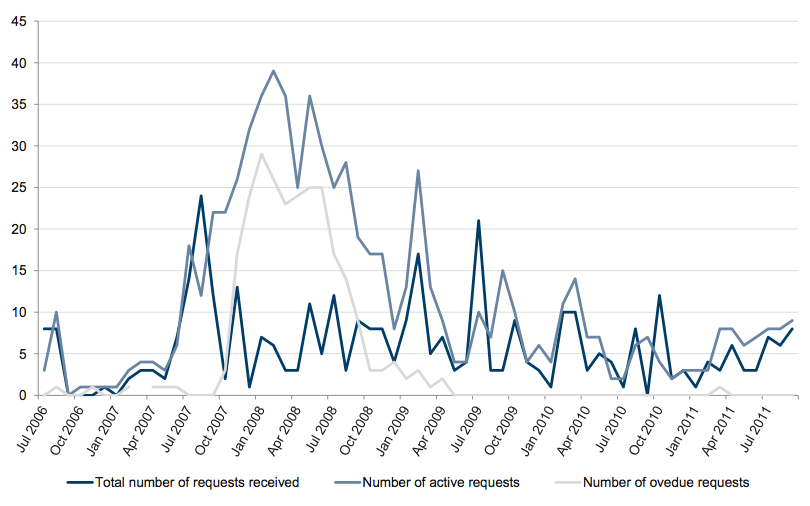
Source: Victorian Auditor-General’s Office.
Figure
A3
Types of FOI requests received each month, July 2006 – September
2011
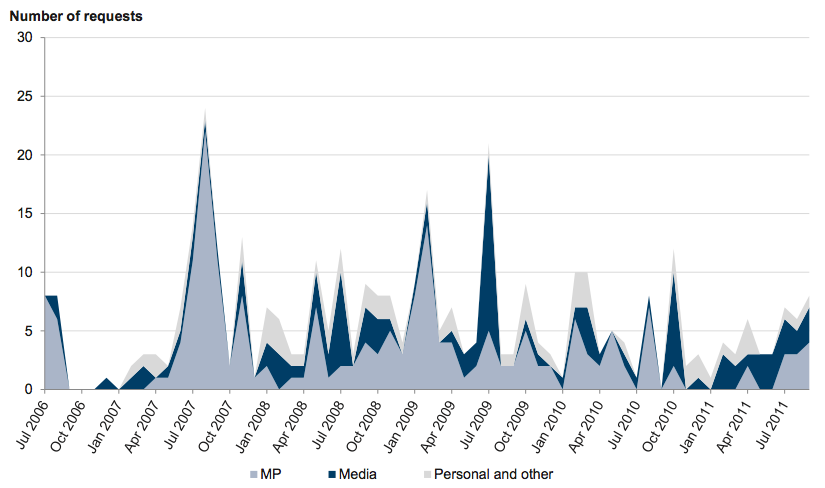
Source: Victorian Auditor-General’s Office.
Figure
A4
Monthly FOI timeliness, July 2006 – September 2011
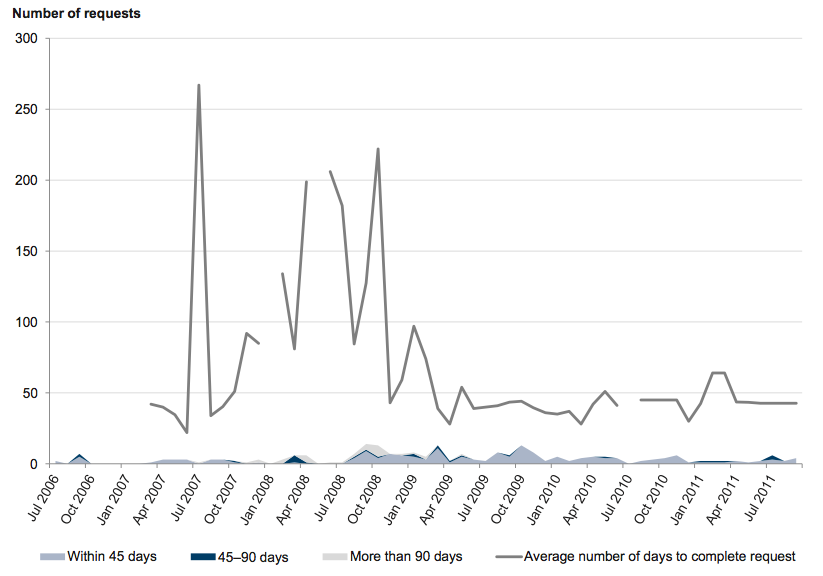
Source: Victorian Auditor-General’s Office.
Department of Education and Early Childhood Development
As Figure A5 shows, the number of requests received by the Department of Education and Early Childhood Development (DEECD) fluctuates between five requests and 34 requests per month.
Figure A6 shows that DEECD typically receives more requests from ‘personal and other’ sources compared to requests from MPs or the media.
DEECD’s average FOI completion time has been below 45 days for every month from July 2006 to September 2011. The department completed all of its requests within 45 days, with the exception of just one month, as shown in Figure A7.
Figure
A5
Monthly FOI workload, July 2006 – September 2011
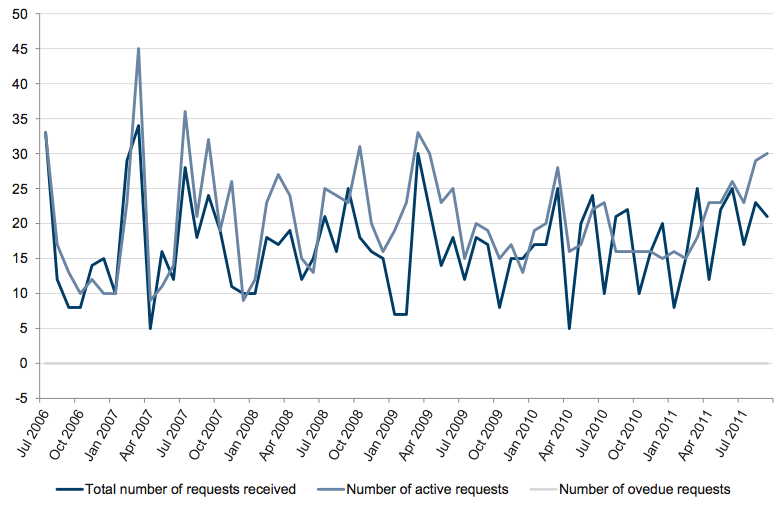
Source: Victorian Auditor-General’s Office.
Figure
A6
Types of FOI requests received each month, July 2006 – September
2011
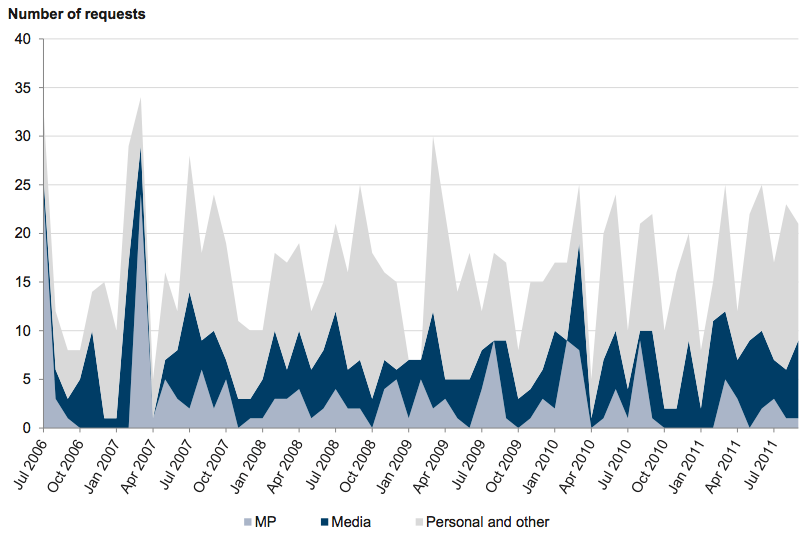
Source: Victorian Auditor-General’s Office.
Figure
A7
Monthly FOI timeliness, July 2006 – September 2011
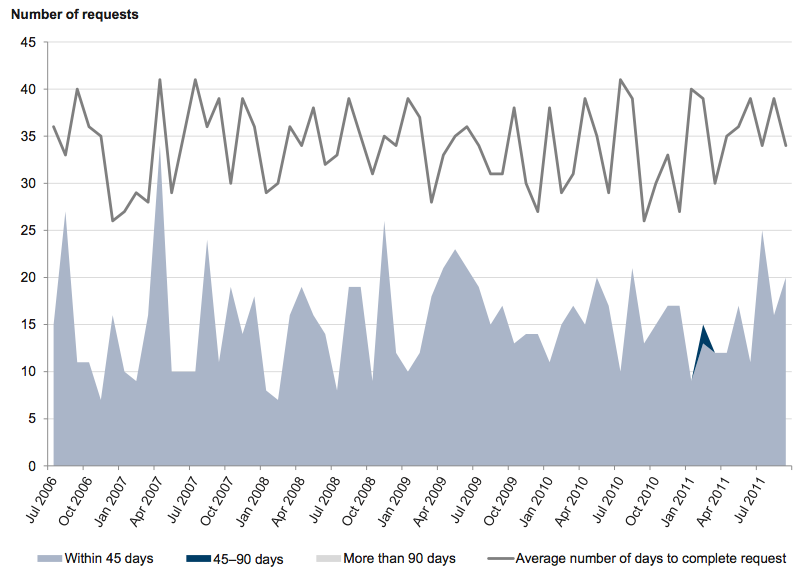
Source: Victorian Auditor-General’s Office.
Department of Health
The data for the Department of Health (DOH) used in Figures A8–A10 began in April 2010, following the machinery-of-government changes that separated DOH from the Department of Human Services (DHS).
Figure A8 shows that, on average, DOH receives 19 FOI requests per month and has 12 overdue requests at the end of each month.
DOH predominantly receives requests from ‘personal and other’ sources as shown in Figure A9.
Figure A10 shows that DOH’s timeliness has fluctuated from month to month, but the average time to complete requests have tended to be above 45 days.
Figure
A8
Monthly FOI workload, April 2010 – September 2011
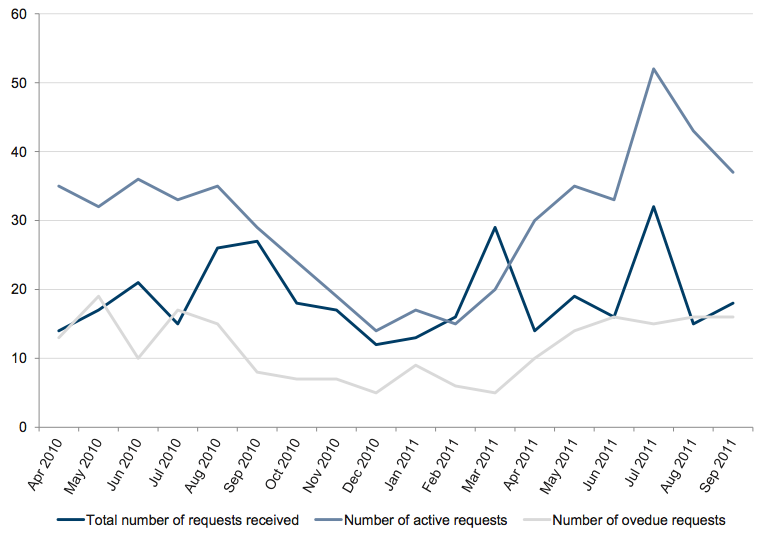
Source: Victorian Auditor-General’s Office.
Figure
A9
Types of FOI requests received each month, April 2010 – September 2011
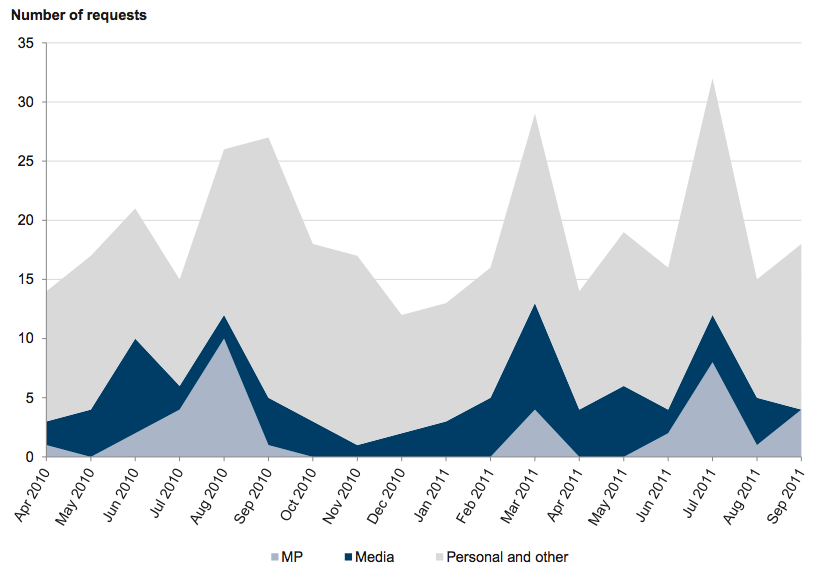
Source: Victorian Auditor-General’s Office.
Figure
A10
Monthly FOI timeliness, April 2010 – September 2011
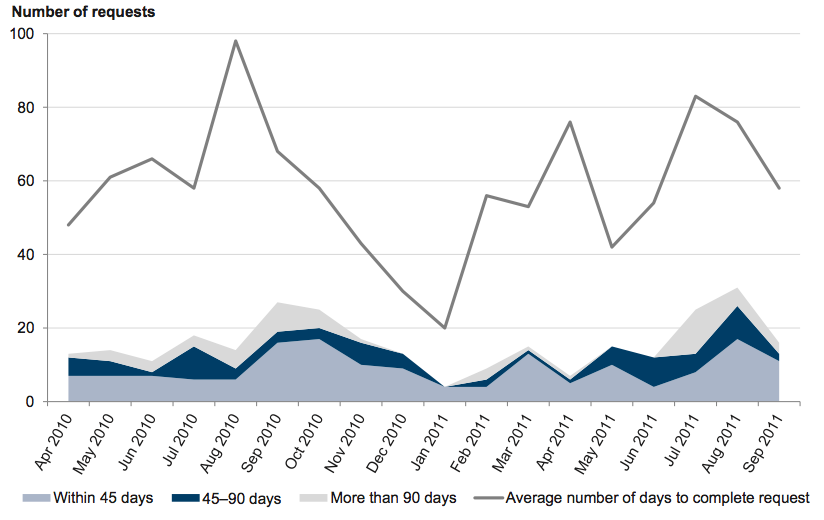
Source: Victorian Auditor-General’s Office.
Department of Human Services
Similar to DOH, the data contained in Figures A11–A13 for DHS are from after April 2010, following the machinery-of-government changes.
Since January 2011 the number of overdue requests reported at the end of each month by DHS has declined, even though the number of active requests has increased, as shown in Figure A11. This is largely attributable to DHS excluding from its figures its inappropriate waiver of fees, which is discussed in greater detail in Part 4 of this report.
As shown in Figure A12, DHS overwhelmingly receives FOI requests from ‘personal and other’ sources compared to MP and media requests.
Figure A13 shows that the overall trend in DHS’s timeliness performance is improving but it remains above 45 days.
Figure
A11
Monthly FOI workload, April 2010 – September 2011
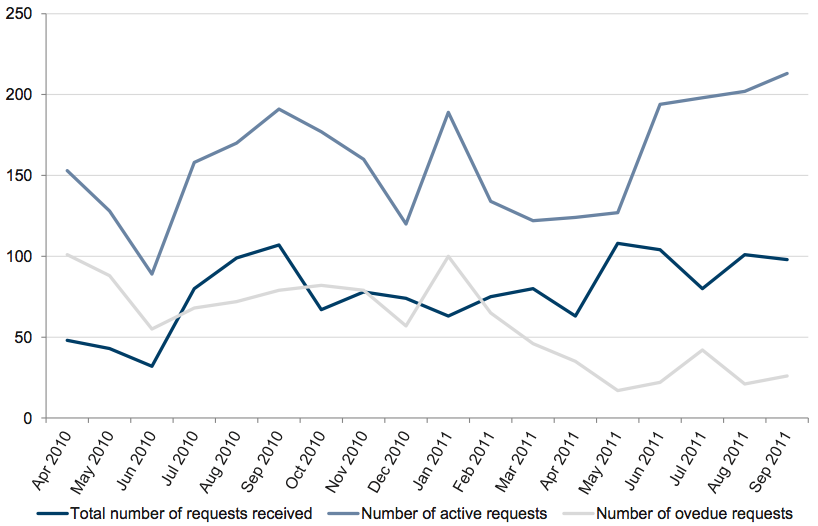
Source: Victorian Auditor-General’s Office.
Figure
A12
Types of FOI requests received each month, April 2010 – September 2011
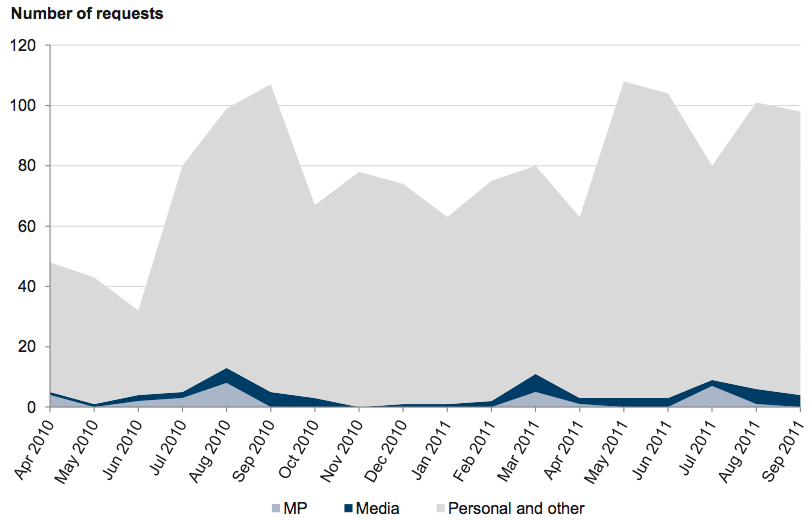
Source: Victorian Auditor-General’s Office.
Figure
A13
Monthly FOI timeliness, April 2010 – September 2011
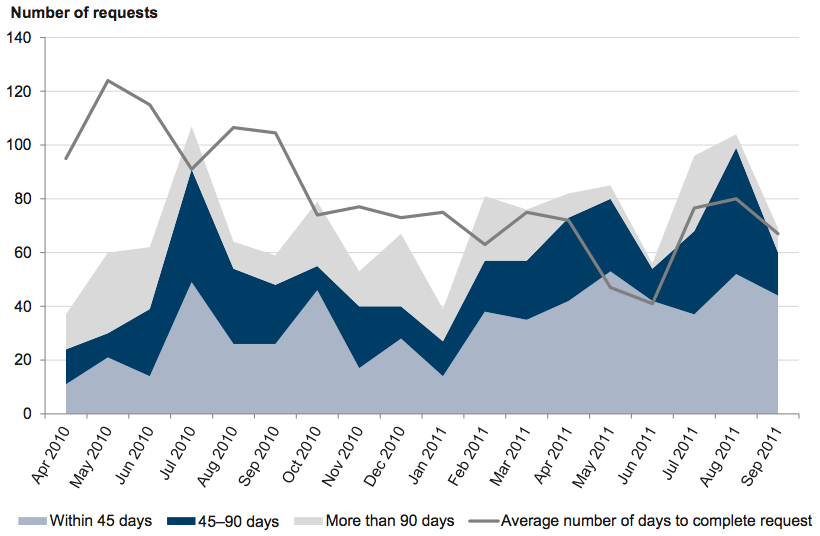
Source: Victorian Auditor-General’s Office.
Department of Justice
As shown in Figure A14, there has been an upward trend in the number of FOI requests received by DOJ.
Figure A15 shows that DOJ predominantly receives FOI requests from ‘personal and other’ sources.
Figure A16 shows a worsening trend in timeliness performance since October 2008.
Figure
A14
Monthly FOI workload, July 2006 – September 2011
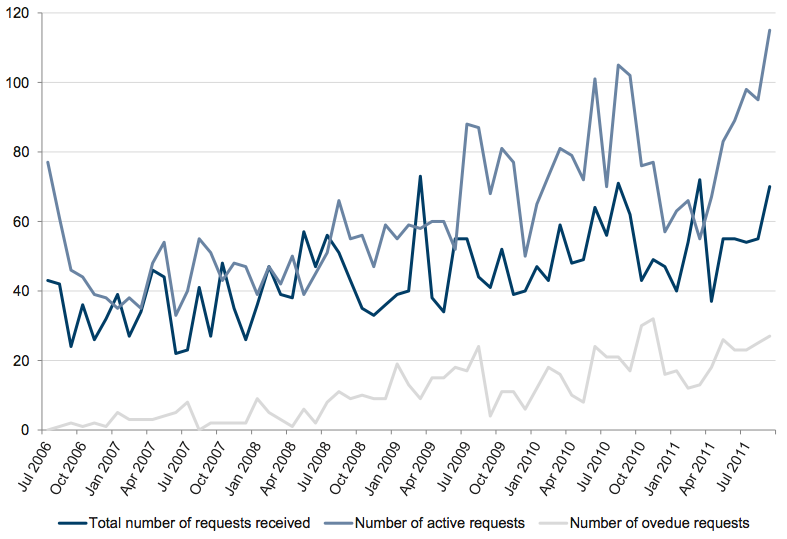
Source: Victorian Auditor-General’s Office.
Figure
A15
Types of FOI requests received each month, July 2006 – September
2011
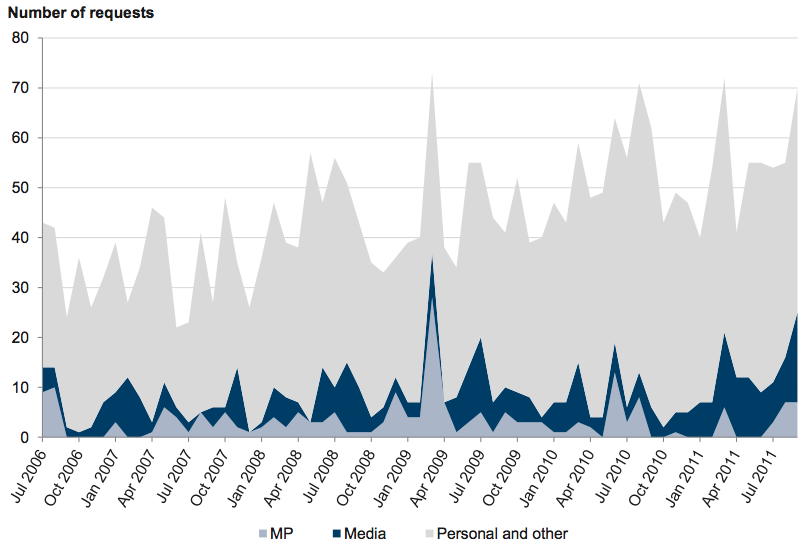
Source: Victorian Auditor-General’s Office.
Figure
A16
Monthly FOI timeliness, July 2006 – September 2011
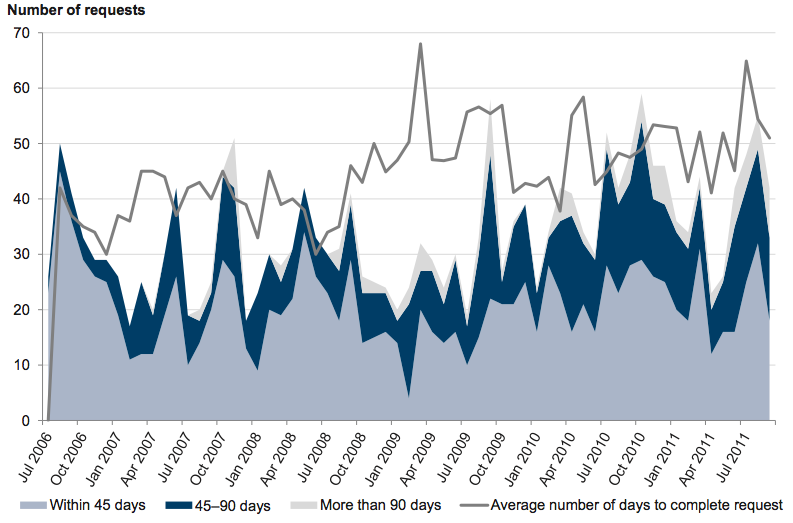
Source: Victorian Auditor-General’s Office.
Department of Planning and Community Development
Figure A17 shows a period from August 2006 until January 2010 where the Department of Planning and Community Development (DPCD) had a high number of active and overdue requests per month. The number of overdue requests began to decline in October 2009.
As demonstrated in Figure A18, DPCD receives a combination of the three different types of requests.
Consistent with Figure A17, Figure A19 shows that there has been an overall trend of improved timeliness for DPCD since December 2009.
Figure
A17
Monthly FOI workload, July 2006 – September 2011
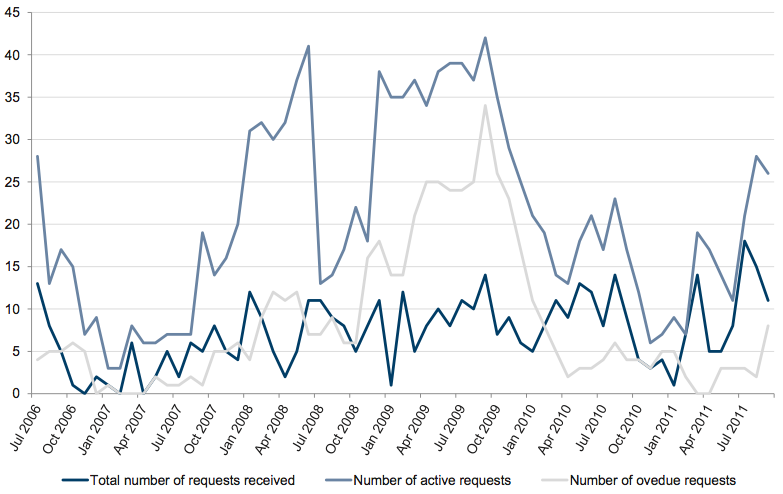
Source: Victorian Auditor-General’s Office.
Figure
A18
Types of FOI requests received each month, July 2006 – September
2011
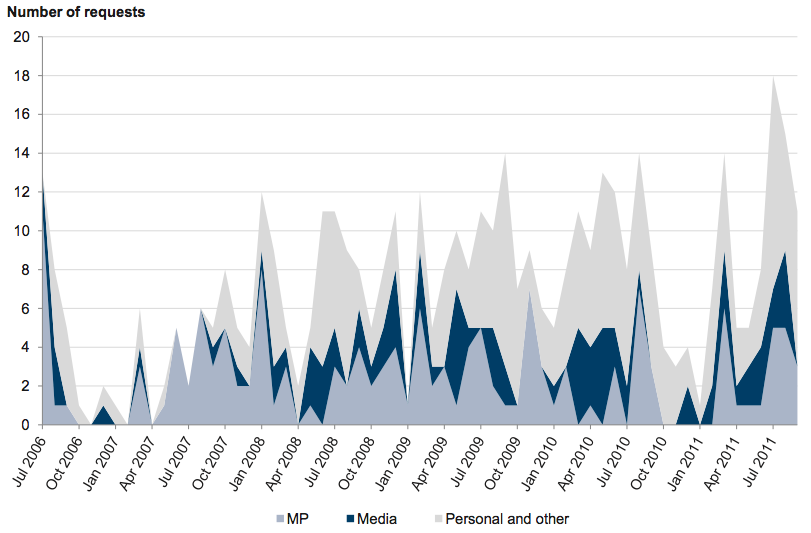
Source: Victorian Auditor-General’s Office.
Figure
A19
Monthly FOI timeliness, July 2006 – September 2011
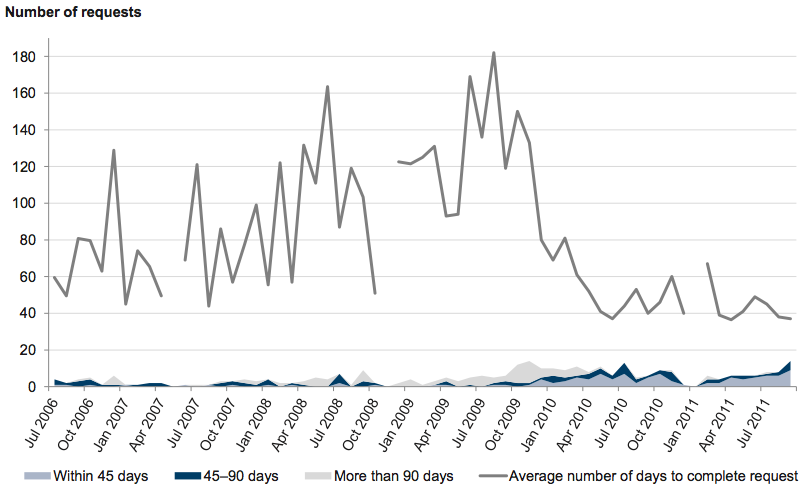
Source: Victorian Auditor-General’s Office.
Department of Premier and Cabinet
Figure A20 shows that the Department of Premier and Cabinet (DPC) had a spike in the numbers of FOI requests received, active requests and overdue requests in April 2010.
DPC typically receives either MP or media requests, receiving only a low number of requests from ‘personal and other’ sources, as shown in Figure A21.
Figure A22 shows a trend of worsening timeliness performance from April 2010. The impact of the lengthy ministerial noting period on DPC’s timeliness is discussed in Part 3 of this report.
Figure
A20
Monthly FOI workload, July 2006 – September 2011
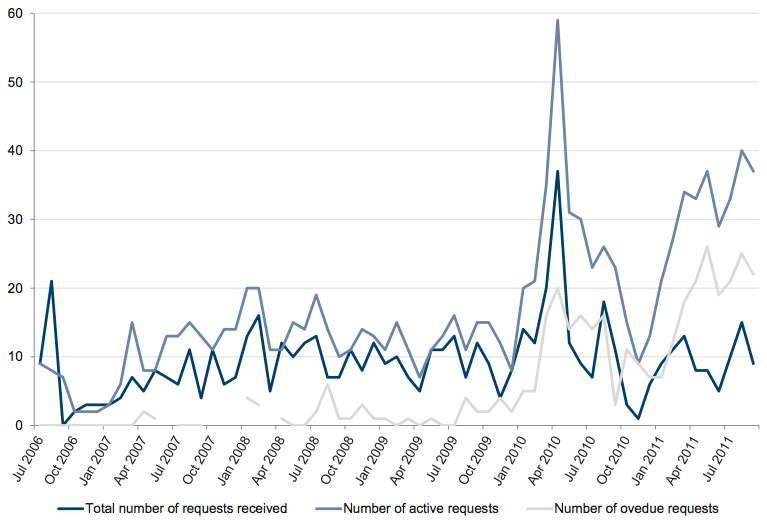
Source: Victorian Auditor-General’s Office.
Figure
A21
Types of FOI requests received each month, July 2006 – September
2011
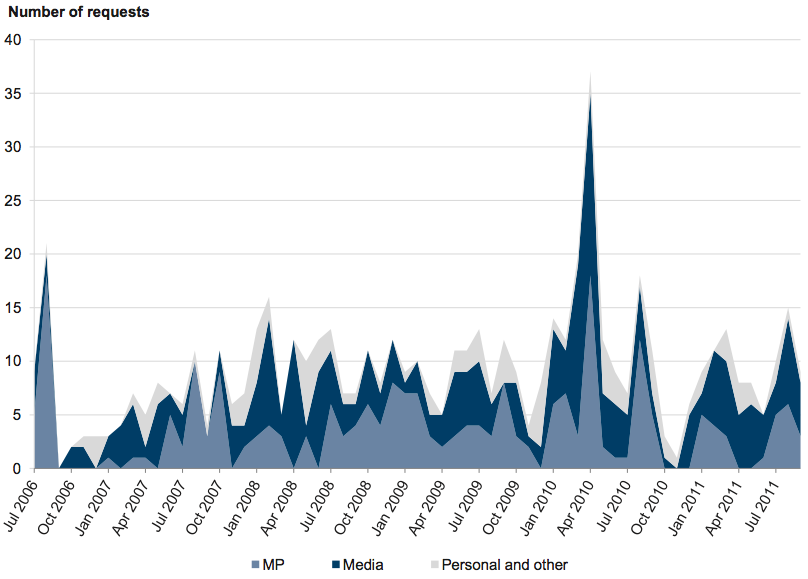
Source: Victorian Auditor-General’s Office.
Figure
A22
Monthly FOI timeliness, July 2006 – September 2011
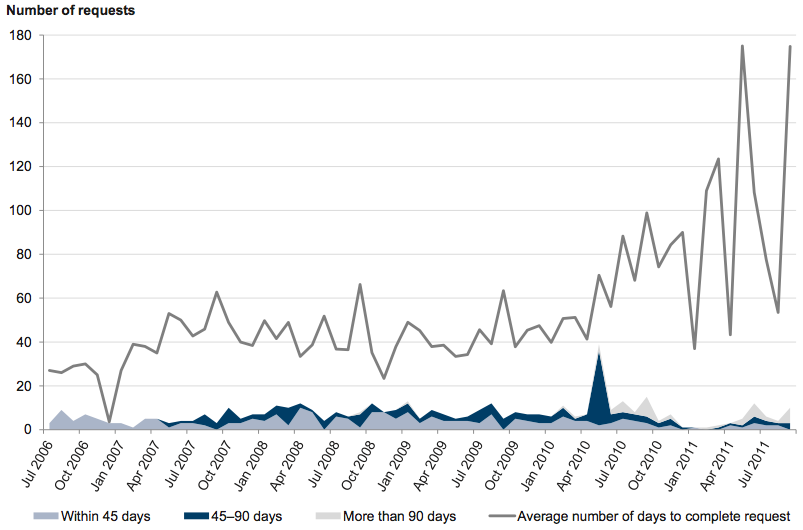
Source: Victorian Auditor-General’s Office.
Department of Primary Industries
The Department of Primary Industries (DPI) has had an increase in the number of active and overdue requests from April 2011, as shown in Figure A23.
As demonstrated in Figure A24, DPI receives a combination of the three different types of requests.
DPI’s timeliness performance has fluctuated from month to month, as Figure A25 shows, with a spike in the number of days taken to complete requests in July 2011.
Figure
A23
Monthly FOI workload, July 2006 – September 2011
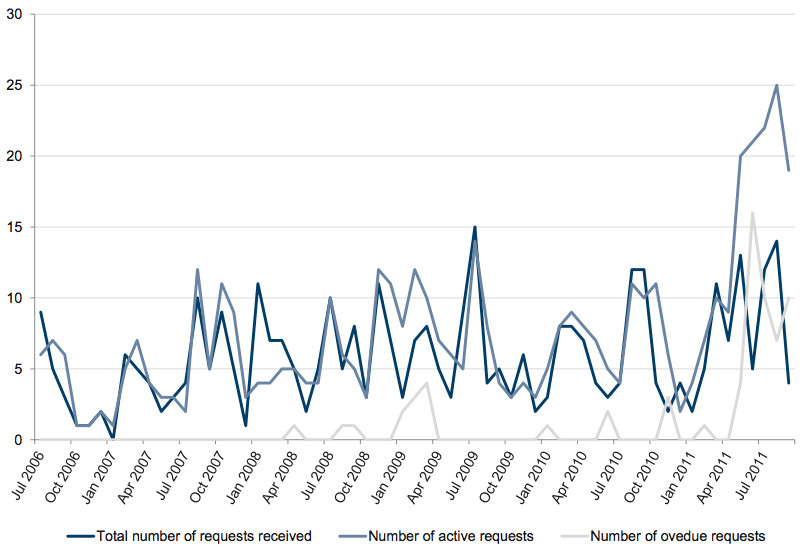
Source: Victorian Auditor-General’s Office.
Figure
A24
Types of FOI requests received each month, July 2006 – September
2011
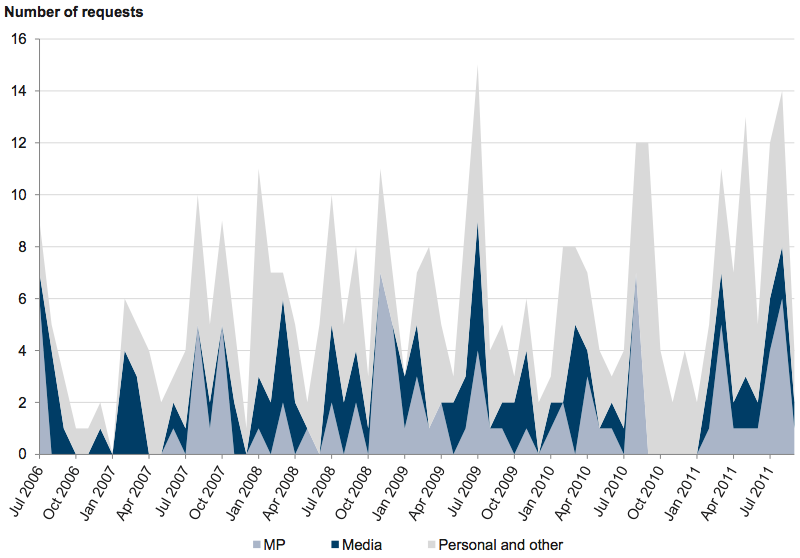
Source: Victorian Auditor-General’s Office.
Figure
A25
Monthly FOI timeliness, July 2006 – September 2011
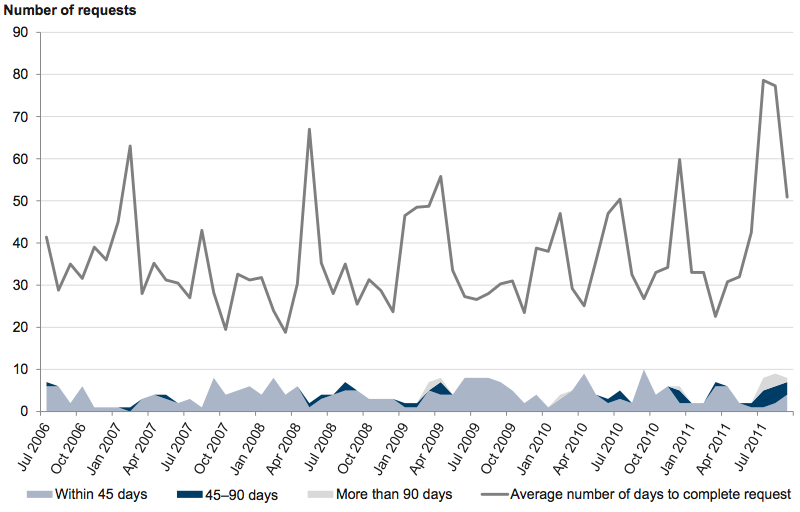
Source: Victorian Auditor-General’s Office.
Department of Sustainability and Environment
The workload of the Department of Sustainability and Environment (DSE) has fluctuated greatly between July 2006 and September 2011, as shown in Figure A26.
While DSE tends to receive more requests from ‘personal and other’ sources, Figure A27 shows that it received a spike in MP requests in 2009.
DSE’s timeliness performance has similarly fluctuated, as shown in Figure A28. This trend can be seen in the data from January to September 2011.
Figure
A26
Monthly FOI workload, July 2006 – September 2011
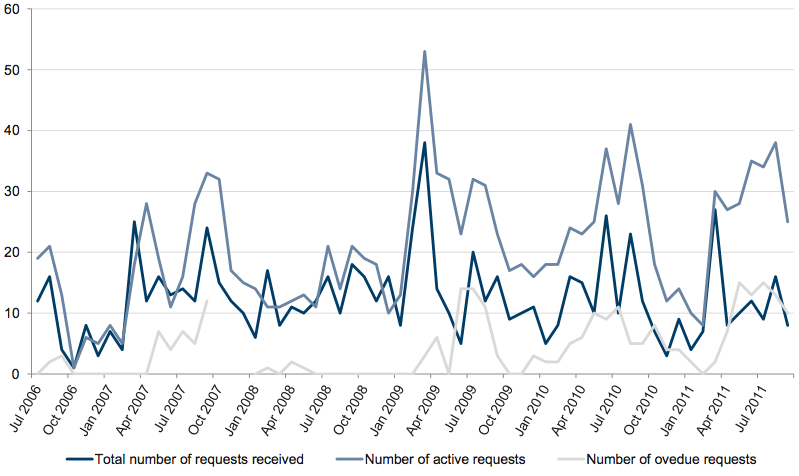
Source: Victorian Auditor-General’s Office.
Figure
A27
Types of FOI requests received each month, July 2006 – September
2011
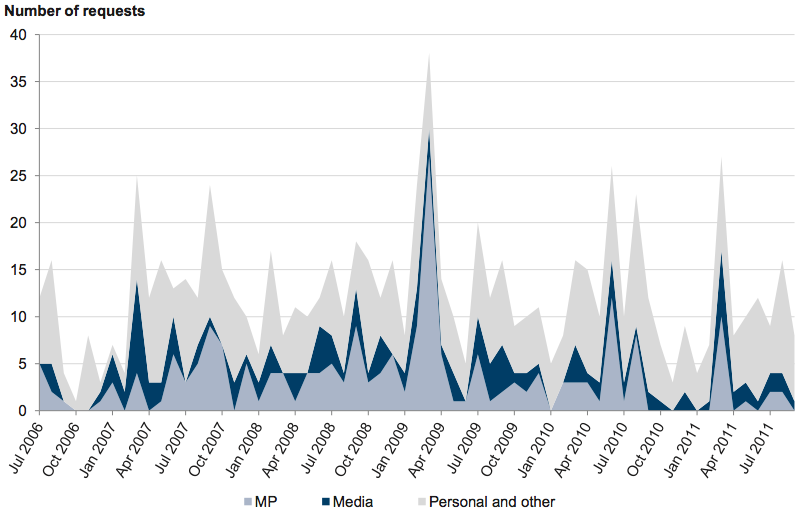
Source: Victorian Auditor-General’s Office.
Figure
A28
Monthly FOI timeliness, July 2006 – September 2011
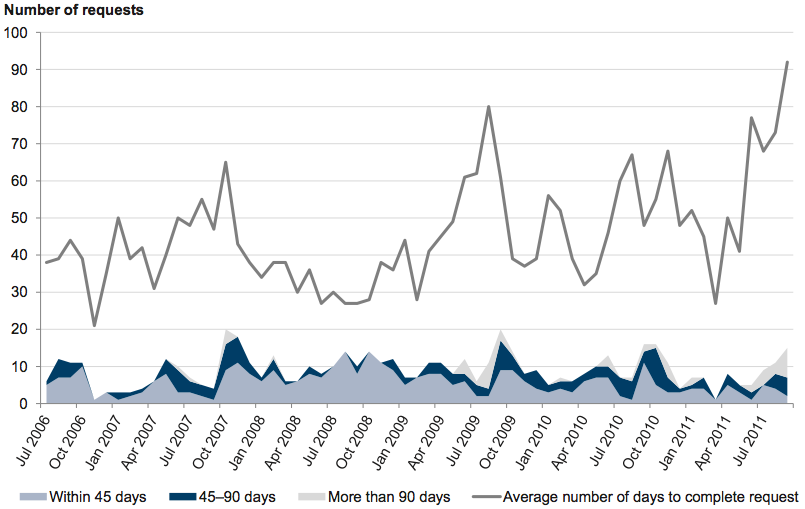
Source: Victorian Auditor-General’s Office.
Department of Transport
Figure A29 shows a downward trend in the number of active and overdue FOI requests for the Department of Transport (DOT).
As demonstrated in Figure A30, DOT receives a combination of the three different types of requests.
Figure A31 shows that DOT’s timeliness performance has fluctuated greatly over the five-year period.
Figure
A29
Monthly FOI workload, July 2006 – September 2011
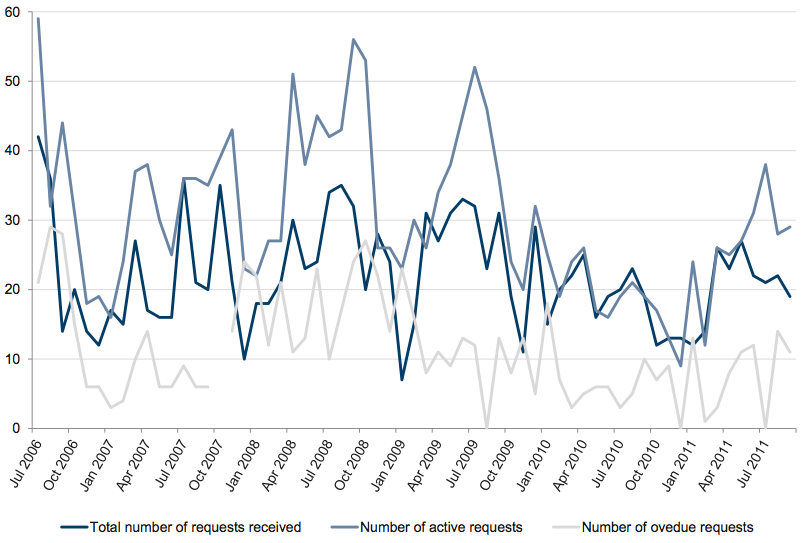
Source: Victorian Auditor-General’s Office.
Figure
A30
Types of FOI requests received each month, July 2006 – September
2011
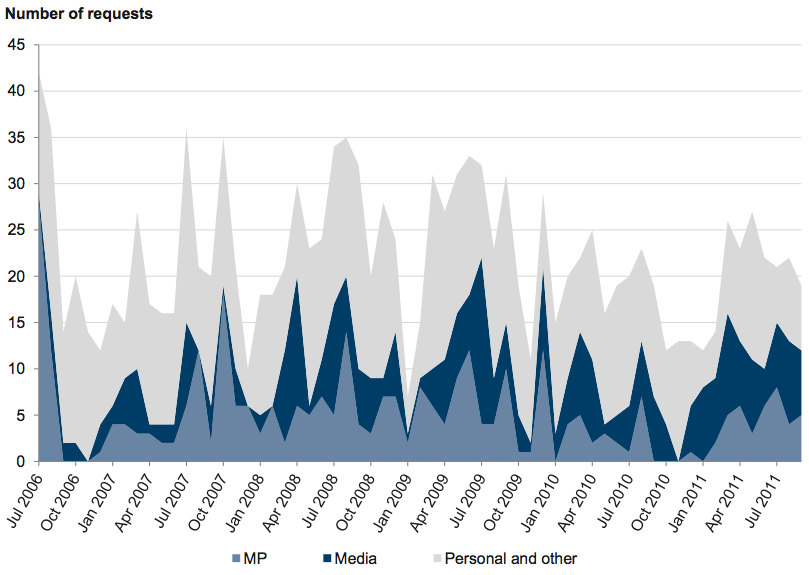
Source: Victorian Auditor-General’s Office.
Figure
A31
Monthly FOI timeliness, July 2006 – September 2011
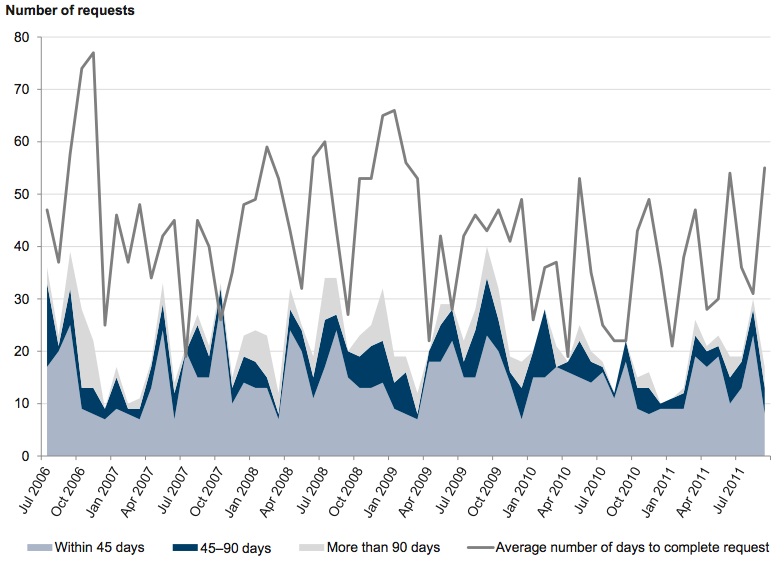
Source: Victorian Auditor-General’s Office.
Department of Treasury and Finance
While the Department of Treasury and Finance’s (DTF) workload has fluctuated significantly from July 2006 to September 2011, Figure A32 shows that it has not received more than 16 FOI requests in a month over this time.
DTF typically receives more MP requests than any other type but has experienced spikes in the number of media requests over the five years, as shown in Figure A33. DTF receives very few requests from ‘personal and other’ sources.
For the most part, DTF’s timeliness performance has remained below the 45 day time limit, as shown in Figure A34.
Figure
A32
Monthly FOI workload, July 2006 – September 2011
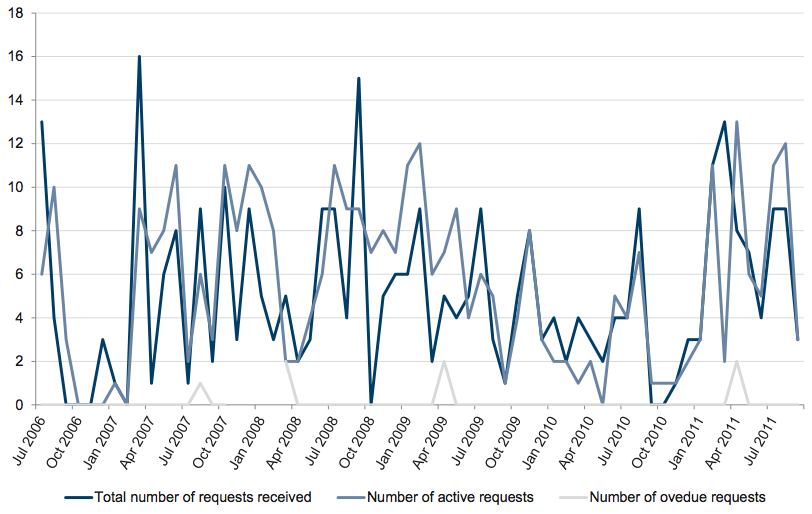
Source: Victorian Auditor-General’s Office.
Figure
A33
Types of FOI requests received each month, July 2006 – September
2011
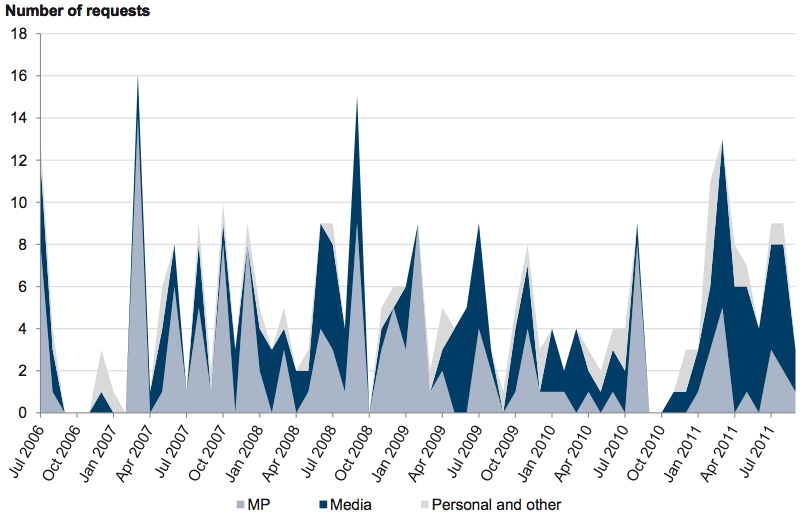
Source: Victorian Auditor-General’s Office.
Figure
A34
Monthly FOI timeliness, July 2006 – September 2011
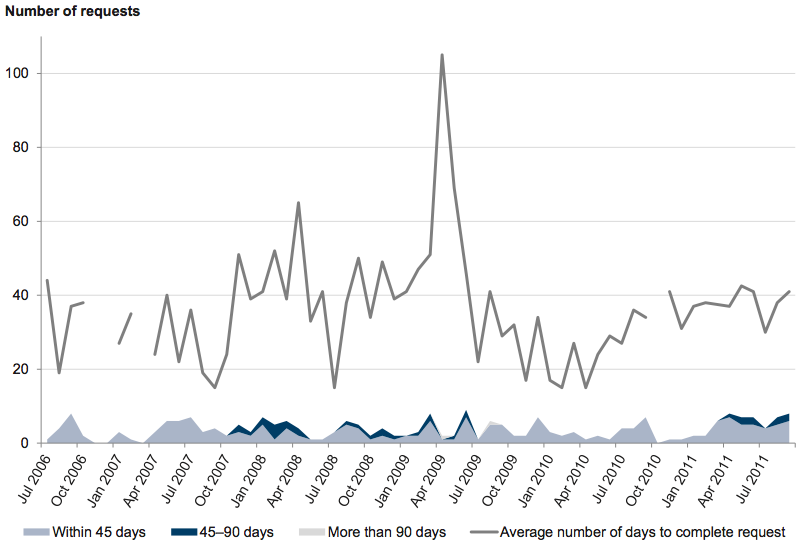
Source: Victorian Auditor-General’s Office.
Victoria Police
Figure A35 shows the high FOI workload that Victoria Police experienced from July 2006 to September 2011. This is discussed in Part 5 of this report.
Victoria Police overwhelmingly receives most of its requests from ‘personal and other’ sources, as shown in Figure A36.
Figure A37 demonstrates Victoria Police’s historically poor timeliness performance, with average days to complete a request remaining well over 45 days every month. This is discussed in Parts 3 and 5.
Figure
A35
Monthly FOI workload, July 2006 – September 2011
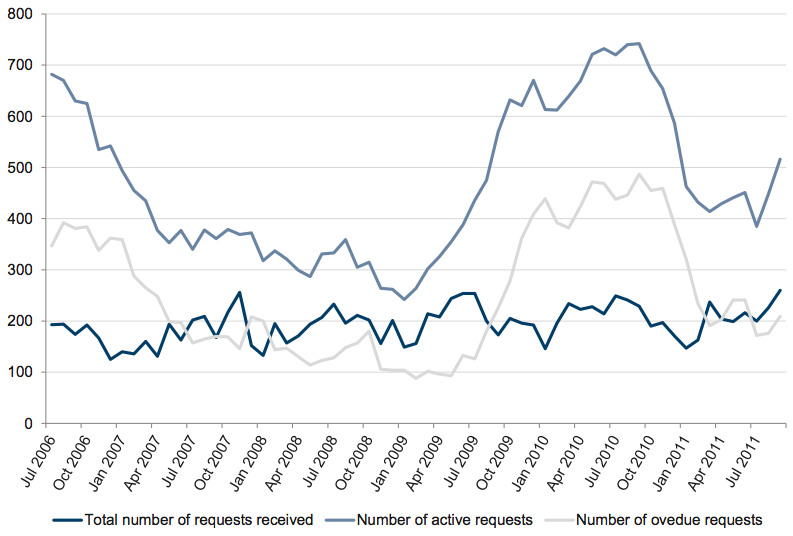
Source: Victorian Auditor-General’s Office.
Figure
A36
Types of FOI requests received each month, July 2006 – September
2011
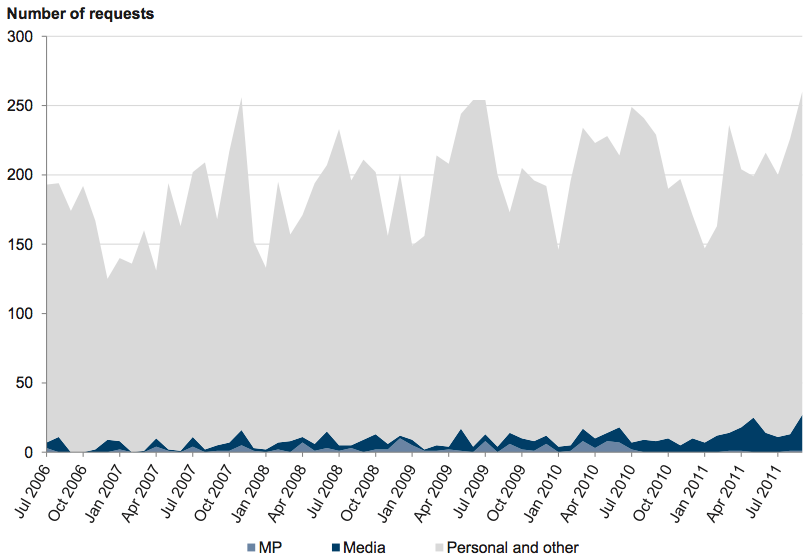
Source: Victorian Auditor-General’s Office.
Figure
A37
Monthly FOI timeliness, July 2006 – September 2011
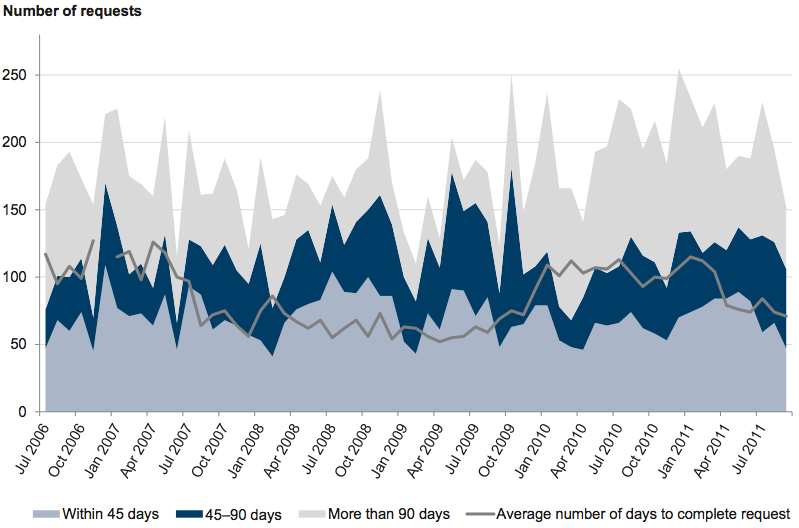
Source: Victorian Auditor-General’s Office.
Appendix B. Audit Act 1994 section 16—submissions and comments
Introduction
In accordance with section 16(3) of the Audit Act 1994 a copy of this report was provided to the Department of Business and Innovation, the Department of Education and Early Childhood Development, the Department of Health, the Department of Human Services, the Department of Justice, the Department of Planning and Community Development, the Department of Premier and Cabinet, the Department of Primary Industries, the Department of Sustainability and Environment, the Department of Transport, the Department of Treasury and Finance and Victoria Police with a request for submissions or comments.
Responses were received as follows:
- The Department of Business and Innovation
- The Department of Education and Early Childhood Development
- The Department of Health
- The Department of Human Services
- The Department of Justice
- The Department of Planning and Community Development
- The Department of Premier and Cabinet
- The Department of Sustainability and Environment
- The Department of Transport
- The Department of Treasury and Finance
- Victoria Police
The submission and comments provided are not subject to audit nor the evidentiary standards required to reach an audit conclusion. Responsibility for the accuracy, fairness and balance of those comments rests solely with the agency head.
